Voice speed
Text translation, source text, translation results, document translation, drag and drop.


Website translation
Enter a URL
Image translation

209 Most Common Hindi Phrases for Travel [PLUS Printable & Audio]
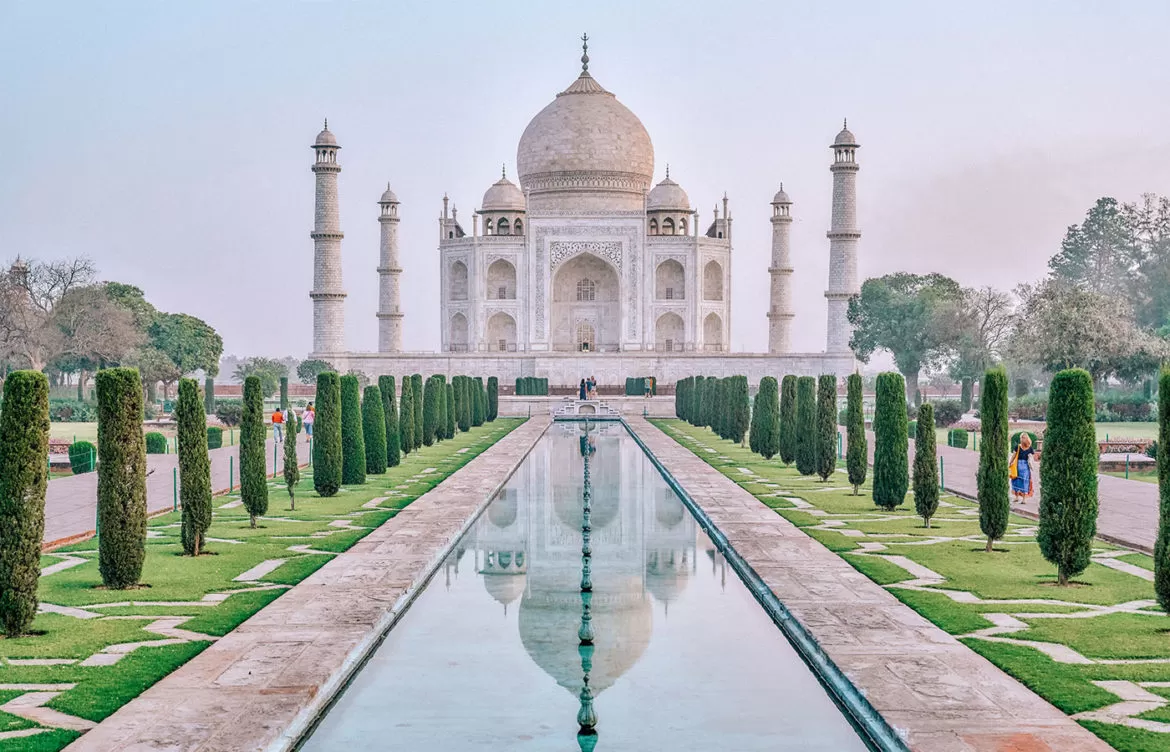
Visiting the Taj Mahal or ordering a yummy curry? Then you need this free printable guide with common Hindi phrases for travel.
Travelling to India and want to learn some common Hindi phrases? You’re in the right place! You don’t have to learn the entire Hindi language to be travel fluent . Just being able to understand and use common Hindi phrases and expressions will make all the difference when it comes to comprehension. This travel phrase guide will introduce you to the Hindi language with details about its origin, where it’s spoken, and more importantly, how to understand and speak Hindi.
Just like all my other travel phrase cheat-sheets , this travel phrase guide full of useful phrases in Hindi includes practical phrases and vocabulary which will help you better understand its speakers and have more meaningful conversations and interactions. To help me create this guide, I asked my friend and Hindi teacher, Babita Craig from Babita’s School of Hindi to provide translations, transliterations, and audio clips to make the learning process easier.
Want to have fun whilst learning Hindi? Struggling to find decent Hindi language resources? I recommend getting uTalk . Available as a desktop site and app, uTalk is awesome for learning key words and phrases in Hindi, especially if you want to use it for travel purposes. It’s great for beginners getting started in a language and invaluable for intermediates looking to fill in gaps in their vocabulary and pronunciation.
What I love most about uTalk is that you can jump around their extensive library of topics and choose what you want to learn, when you want, and at your own pace. Because I believe in uTalk so much, I reached out to them and we’ve teamed up to offer you an exclusive 30% OFF reader discount across all of uTalk’s 140 languages! This offer isn’t available anywhere else! Click here to claim your exclusive 30% discount.
Let’s take a closer look at the Hindi language. Here’s what we’ll cover:
Table of Contents
Where is hindi spoken.
- A Quick History of Hindi
How many people speak Hindi?
Hindi alphabet, hindi pronunciation, hindi grammar, hindi false friends.
- Hindi Words in English
Hindi Culture Travel Tips
How to be polite.
- How to Ask Questions
- Eating out and Ordering Food
Getting Around
Sightseeing, days of the week, emergencies.
- 209 Common Hindi Phrases for Travel [Infographic]
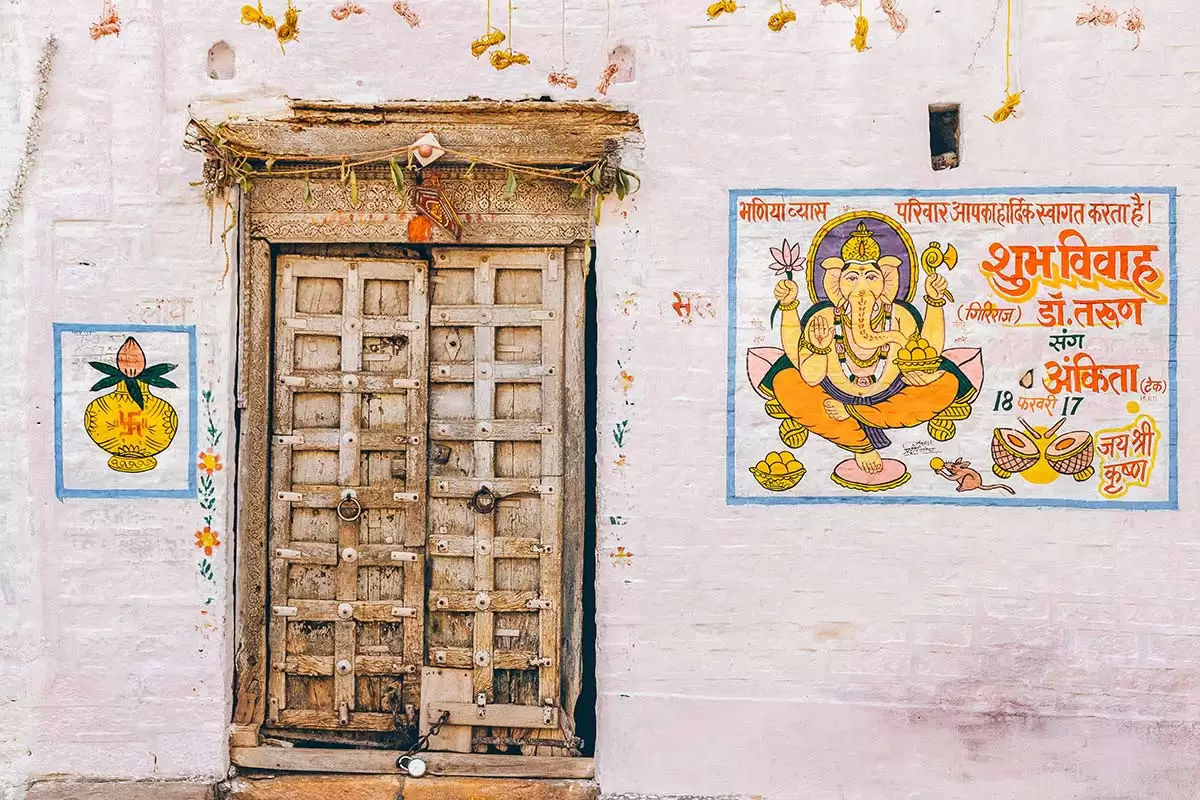
A quick history of the Hindi language
Hindi has its roots in the ancient Indo-Aryan language of Sanskrit; however, modern Hindi, as it is spoken today across India, is closely associated with Urdu, with the main differences being in how they are written and in the high-level vocabulary and culture on which they draw. For example, Hindi, like Sanskrit, is written in the Devanagari script, and is heavily influenced by Hindu culture and history, whilst Urdu, is written in a modified version of Persian, and uses many Persian and Arabic words. Modern Hindi has also taken on many English words, which you will hear used in its everyday spoken form.
The following sentence is a great example of this:
मेज़ पर पानी की बोतल है ( mez par paanee kee botal hai ) – The water bottle is on the table.
Here, the Hindi word for water is used ( paanee ), the Urdu word for table ( mez ) and the English word for bottle , albeit with a slightly different pronunciation.
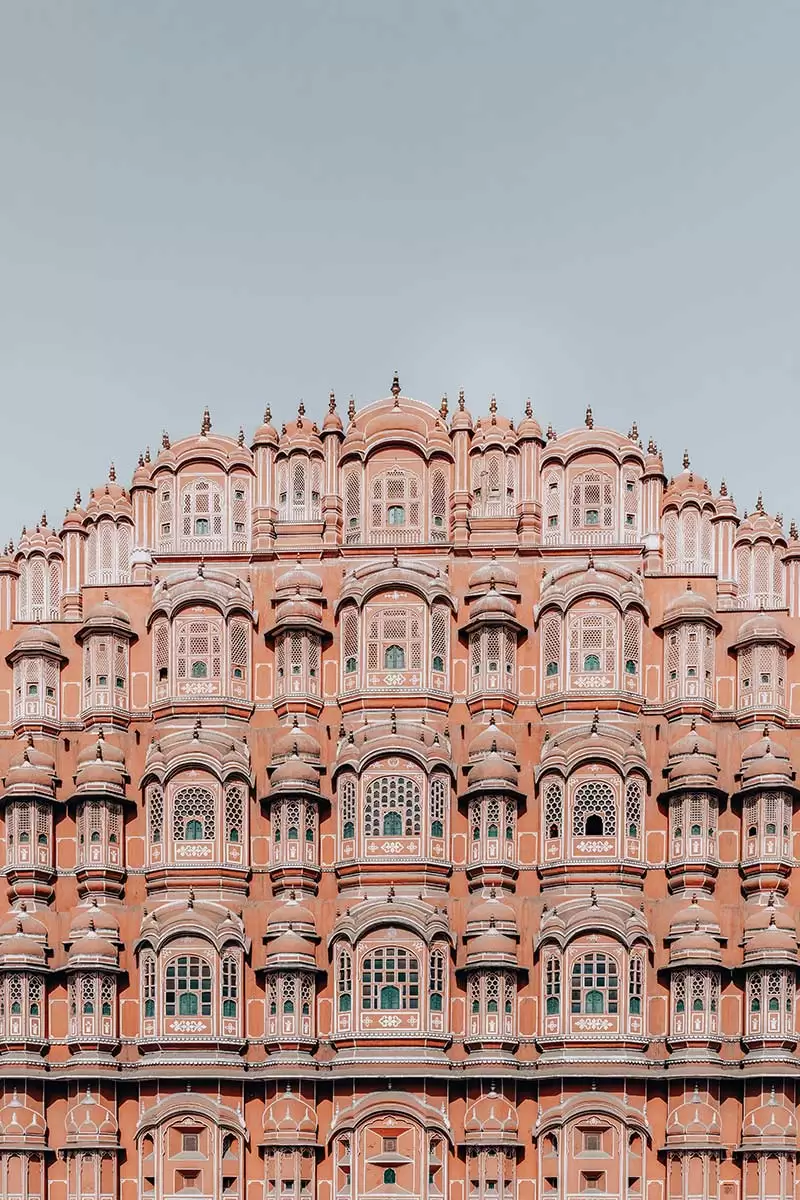
Hindi is written in the Devanagari script, which has 46 letters in total; 35 consonants and 11 vowels, as well as three conjunct letters (a combination of two consonants), which are commonly included.
अ (a) आ (aa) इ (i) ई (ee) उ (u) ऊ (oo) ऋ (ri) ए (e) ऐ (ai) ओ (o) औ (au)
Gutturals क (ka) ख (kha) ग (ga) घ (gha) ङ (gn)
Palatals च (cha) छ ( chha) ज (ja) झ (jha) ञ (yn)
Cerebrals ट (ta) ठ (tha) ड (da) ढ (dha) ण (na)
Dentals त (dha) थ (tha) द (da) ध (dha) न (na)
Labials प (pa) फ (pha) ब (ba) भ (bha) म (ma)
Semi-vowels य (ya) र (ra) ल (la) व (va)
Sibilants श (sha) ष (shha) स (sa)
Glottal ह (ha)
Flaps ड़ (da) ढ़ (dha)
Conjunct letters
क्ष (ksha) त्र (tra) ज्ञ (gya)
Hindi is a phonetic language and is pronounced exactly as it is written. This is much simpler to do if you learn how to read the Devanagari script, for when Hindi is written in the Roman script (like English), there is no official, standardised way of doing so, meaning that pronunciations can vary.
One of the most common issues for speakers from a non-South Asian background is the pronunciation of the Hindi letters that are similar to a ‘t’ and ‘d’ in English. This is because there are four separate letters for both in Hindi, all of which are pronounced differently, with some being dental (where the tongue touches the teeth during pronunciation) and some cerebral (where the tongue touches the roof of the mouth during pronunciation).
Although the grammar of Hindi and English is quite different, there is one general rule which will help you to remember how to put together a sentence. The verb is always found at the end of the sentence and the standard sentence construction is subject + object + verb.
You might also be pleased to learn that Hindi does not have determiners that precede nouns like those that you find in English, such as ‘a’, ‘an’ and ‘the’. However, before you celebrate, you should know that all Hindi nouns have an implied gender (masculine or feminine) – that put quite simply – you have no other option but to learn. On a positive note though, Hindi does not contain any punctuation, apart from ‘।’ which is the equivalent of a full stop.
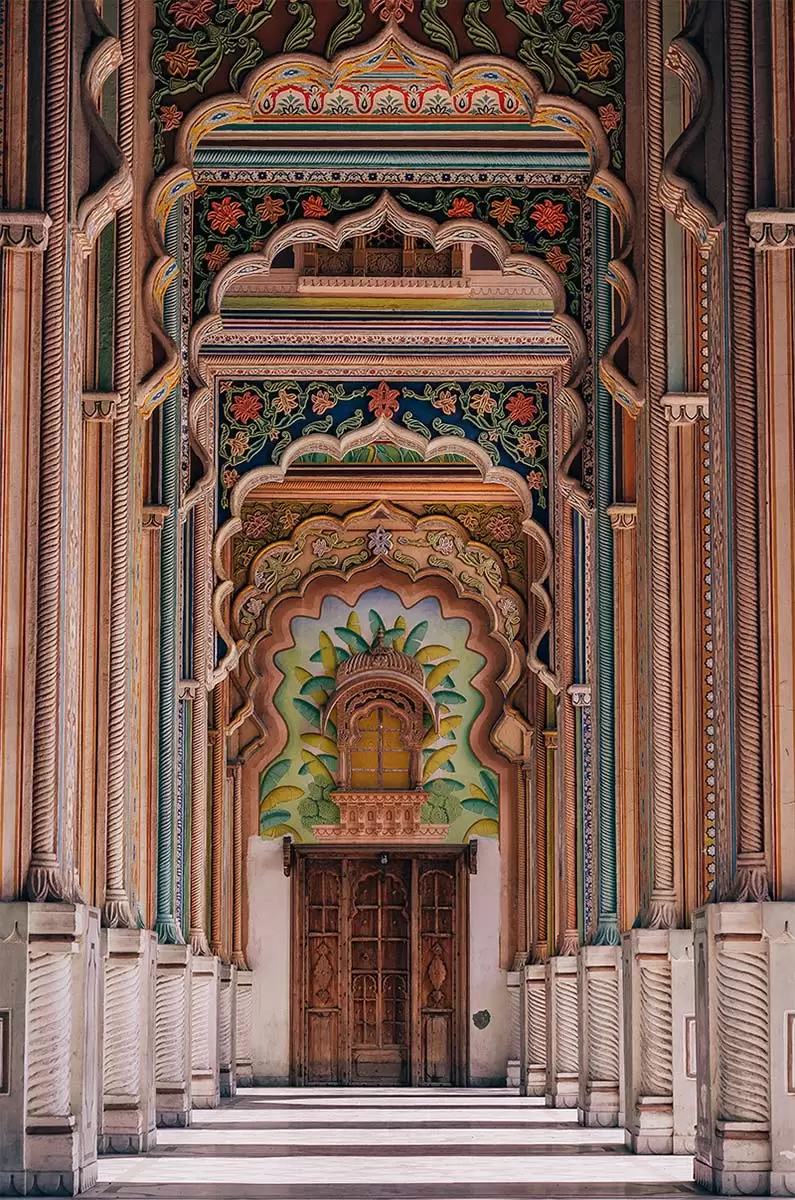
- सफ़र ( safar ) is the Urdu word for travel; however when pronounced it sounds just like the English word suffer.
- लू ( loo ) is the Hindi word for heatstroke but as you know this means something quite different in English.
Hindi words in English
As a result of Britain’s colonial past, there are also a number of Hindi words that are used in English. Here are a couple for you:
- डिंगी ( dingee ) – If you’re fortunate enough to take a trip on the river in India, you may find yourself setting foot onto a dinghy!
- लूट ( loot ) – The English word for loot is taken directly from the Hindi, which similarly means to steal, plunder or pillage.
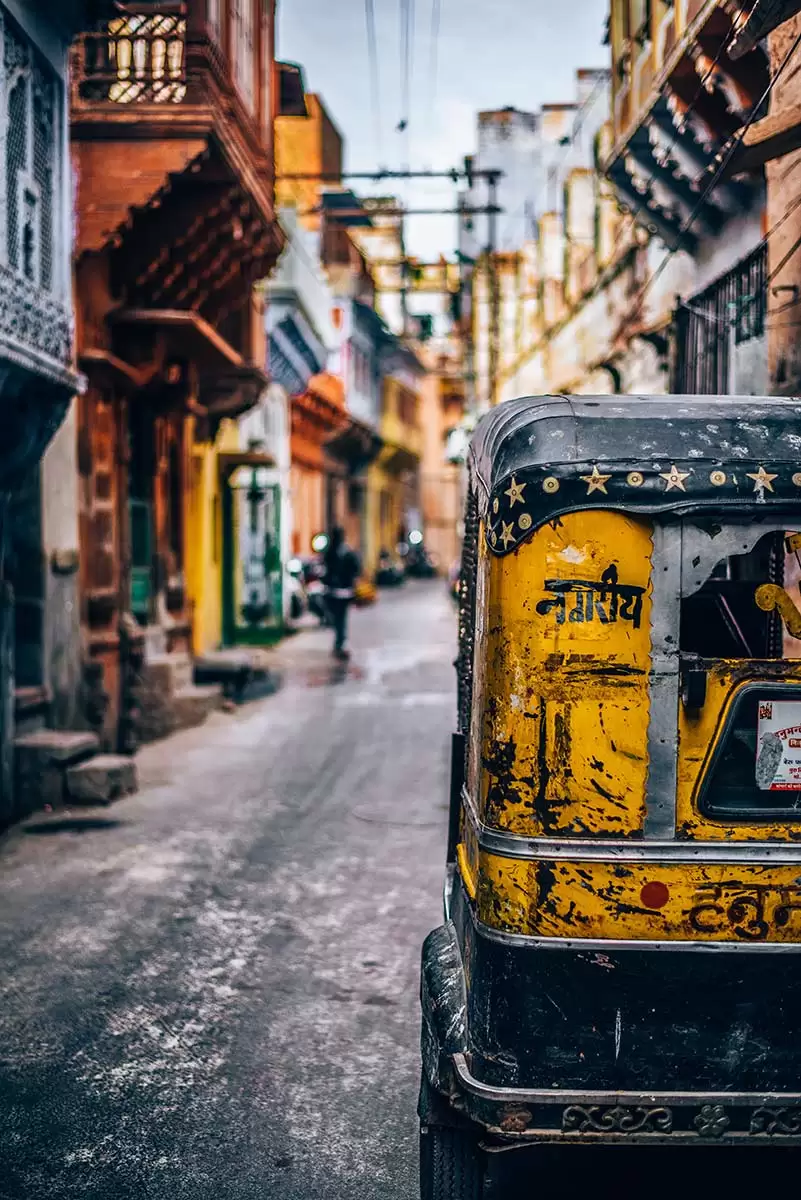
Also, don’t assume that everyone in India will speak or want to speak Hindi with you. Do some prior research on the places that you are visiting and be sensitive to the language and culture of the local population.
If you’re intending to travel to India for any length of time, spend some time getting used to sitting cross-legged on a couch or the ground. It is something that may bring back distant memories of a primary school assembly hall; however, there is nothing more uncomfortable and embarrassing than being invited for dinner at someone’s house and being unable to sit still for the whole evening and then not being able to get up at the end because your knees have locked solid!
Now, let’s take a look at some common Hindi phrases for travellers. NB: When the letter ‘n’ appears in brackets [n], that signifies that the letter before it is nasalised. The ‘n’ in brackets should not be pronounced.
209 Common Hindi Phrases for Travellers
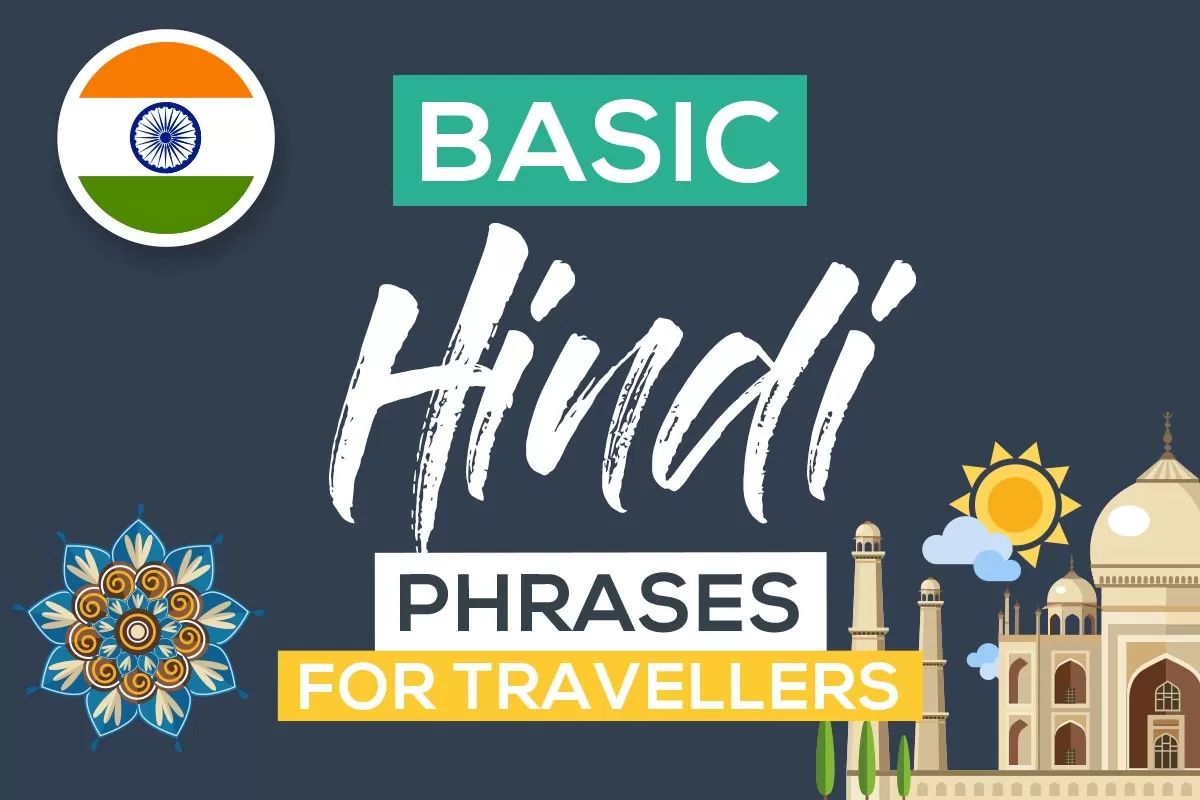
1. Hello – नमस्ते (na-ma-sté) 2. Good morning – शुभ प्रभात (Shubh-pra-bhaat) 3. Good afternoon – नमस्ते (na-ma-sté) 4. Good evening – नमस्ते (na-ma-sté) 5. Good night – शुभ रात्रि (shubh-raa-tree) 6. Goodbye – नमस्ते (na-ma-sté) 7. See you – फिर मिलेंगे (phir milengé) 8. ‘Til next time – अगली बार तक (aaglee baar tak) 9. How are you? – आप कैसे हैं (aap kaisé hai[n]) 10. Good – अच्छा (acchha) 11. So-so – ठीक-ठीक (theek-theek) 12. Not bad – ठीक-ठीक (theek-theek) 13. I’m not well – मैं ठीक नहीं हूँ ( mai[n] theek nahee[n] hoo[n]) 14. Good, thank you, and you? – मैं ठीक हूँ और आप? (mai[n] theek hoo[n] aur aap?) 15. What is your name? – आपका नाम क्या है? (aapka naam kya hai?) 16. My name is… – मेरा नाम _____ है। (mera naam _____ hai?) 17. Where are you from? – आप कहाँ से हैं? (aap kaha[n] sé hai[n]?) 18. I’m from [Insert name of city] – मैं _____ से हूँ ( mai[n] _______ sé hoo[n]) 19. I’m from [Insert name of country] – मैं _____ से हूँ (mai[n] _______ sé hoo[n]) 20. I’m….American (m/f), English (m/f), Australian (m/f), Canadian (m/f) – मैं अमेरिकी हूँ / मैं अंग्रेज़ हूँ / मैं ऑस्ट्रेलियाई हूँ / मैं कनेडियन हूँ ( mai[n] amerikee hoo[n] / mai[n] angrez hoo[n] / mai[n] austreliyaaee hoo[n] / mai(n) kanediyan hoo[n]) 21. It’s nice to meet you – आप से मिलकर ख़ुशी हुई (aap sé milkar khushee hooee)
Greetings Audio
- Good morning
- Good afternoon
- Good Evening
- Til next time
- How are you
- I'm not well
- Good, thank you, and you
- What is your name?
- My name is...
- Where are you from?
- I'm from (insert name of city)
- I'm from (insert name of country)
- I'm American/English/Australian/Canadian
- Its nice to meet you
22. Please – कृपया (krip-ya) NB: Please is usually implied in the verb – so this word is not commonly used. 23. Thank you – धन्यवाद (dhany-vaad) 24. Thank you very much – बहुत धन्यवाद (bahut dhany-vaad) 25. You’re welcome – आपका स्वागत है (aapka swaagat hai) 26. Yes – हाँ (haa[n]) 27. No – नहीं (nahee[n]) 28. That’s fine / ok – यह ठीक है (yeh theek hai) 29. Excuse me (to get attention) – सुनिए ( Suniyé) 30. Excuse me (to get past someone) – माफ़ कीजिए (maaf keejiyé) 31. I’m sorry – माफ़ कीजिए (maaf keejiyé) 32. I don’t understand – मैं नहीं समझा (m.) / मैं नहीं समझी (f.) (mai[n] nahee[n] sam-jha (m.] / mai[n] nahee[n] sam-jhee (f.)) 33. Do you speak English? – क्या आप अंग्रेज़ी बोलते हैं? (kya aap angrezee bolté hai[n]?) 34. I don’t speak Hindi – मैं हिंदी नहीं बोलता हूँ (m.) / मैं हिंदी नहीं बोलती हूँ (f.) – (( m.) mai[n] hindee nahee[n] bolta hoo[n] / (f.) mai(n) hindee nahee[n] boltee hoo[n].) 35. I only speak a little bit of Hindi – मैं सिर्फ़ थोड़ी-थोड़ी हिंदी बोलता हूँ (m.) / मैं सिर्फ़ थोड़ी-थोड़ी हिंदी बोलती हूँ (f.) (mai[n] sirf thodee-thodee hindee bolta hoo[n] (m.) / mai[n] sirf thodee-thodee hindee boltee hoo[n] (f.)) 36. Can you please repeat that slowly? – क्या आप वह फिर से धीरे-धीरे बोल सकते हैं (kya aap woh phir se dheeré-dheeré bol sakté hai[n]?) 37. Maybe – शायद (shaayad) 38. I don’t know – मुझको मालूम नहीं (mujhko maaloom nahee[n]) 39. I don’t think so – मैं ऐसा नहीं सोचता हूँ (m.) / मैं ऐसा नहीं सोचती हूँ (f.) (mai[n] aisa nahee[n] sochta hoo[n] (m.) / mai[n] aisa nahee[n] sochtee hoo[n] (f.)) 40. Certainly! Of course! – ज़रूर बिल्कुल (zaroor / bilkul)
How to be Polite Audio
- Thank you very much
- You're welcome
- That's fine, ok
- Excuse me (to get attention)
- Excuse me (to get past someone)
- I don't understand
- Do you speak English
- I don't speak Hindi
- I only speak a little Hindi
- Can you please repeat that slowly?
- I don't know
- I don't think so
- Certainly! Of course!
- May I pay with cash?
How to ask Questions
41. Where is …? ______ कहाँ है? (______ kaha[n] hai?) 42. Where are…? ______ कहाँ हैं? (______ kaha[n] hai?) 43. Where? – कहाँ? (kaha[n]?) 44. How? – कैसा? ( kaisa?) 45. How much? – कितना? ( kitna?) 46. Who? – कौन? (kaun?) 47. When? – कब? (kab?) 48. Why? – क्यों? (kyo[n]?) 49. What? – क्या? (kya?) 50. Which? – कौन सा / सी? (kaun sa/see?) 51. How much does this cost? – यह कितने का है? (yeh kitné ka hai?) 52. How much does that cost? – वह कितने का है? (woh kitné ka hai?) 53. Where is the toilet? – शौचालय कहाँ है? (shau-chaa-lay kaha[n] hai?) 54. I would like… – मुझको _____ चाहिए (mujhko _____ chaahiyé)
How to ask Ask Questions Audio
- Where is...?
- Where are...?
- How much does this cost?
- How much does that cost?
- Where is the toilet?
- Can I have...
- I would like...
Eating Out & Ordering Food
55. Where is a good restaurant? – अच्छा भोजनालय कहाँ है? (acchha bhoj-naa-lay kaha[n] hai?) 56. What shall we make for you? – हम आप के लिए क्या बनायें? (hum aap ké liyé kya banaayé[n]?) 57. How many are you? – आप कितने लोग हैं? (aap kitné log hai[n]?) 58. Salad – सलाद (salaad) 59. Dessert – मिठाई / मीठी चीज़ (mithaa-ee) (sweets) / (meethee cheez) (sweet dish) 60. Drinks? पेय / ड्रिंक्स – (pey) (this is almost never used) / drinks – the English word is ordinarily used 61. Another one, please. – एक और दीजिए (ek aur deejiyé) 62. I would like… – मुझको _____ चाहिए (mujhko _____ chaahiyé) 63. The menu, please – मेन्यू दीजिए (menu deejiyé) 64. Two beers, please – दो बियर दीजिए (do biar deejiyé) 65. A bottle of wine, please – एक वाइन की बोतल दीजिए (ek vaain kee botal deejiyé) 66. Red wine – लाल वाइन (laal vaain) 67. White wine – सफ़ेद वाइन (safed vaain) 68. A bottle of still water – पानी की बोतल (paani kee botal) 69. A bottle of sparking water – सोडे की बोतल (sode kee botal) 70. What do you recommend? – आप क्या सलहा देंगे? (aap kya salha dengé?) 71. Is the sauce spicy? – क्या ग्रेवी तीख़ी है? (kya grevee teekhee hai?) 72. I’m allergic to… – मुझको _____ से अलेरजी है (mujhko _____ sé allergee hai) 73. I’m a vegetarian – मैं शाकाहारी हूँ (mai[n] shaakaahaari hoo[n]) 74 The bill, please – बिल दीजिए (bill deejiyé) 75. Enjoy your food! – खाने का मज़ा लीजिए (khané ka maza leejiyé) 76. It was delicious! – खाना स्वादिष्ट था (khana swaadisht tha)
Eating Out & Ordering Food Audio
- Where is a good restaurant?
- What shall we make for you?
- How many are you?
- Another one, please
- The menu, please
- Two beers, please
- A bottle of wine, please
- A bottle of still water
- A bottle of sparking water
- What do you recommend?
- Is the sauce spicy?
- I'm allergic to...
- I'm a vegetarian
- The bill, please
- Enjoy your food
- The food was delicious
77. I’m(male) – मैं खो गया हूँ (mai[n] kho gaya hoo[n]) 78. I’m lost (female) – मैं खो गयी हूँ (mai[n] kho gayee hoo[n]) 79. I would like to go to… – मैं _____ जाना चाहता हूँ (m.) / मैं ______ जाना चाहती हूँ (f.) ( mai[n] ____ jaana chaahta hoo[n] (m.) / mai[n] ____ jaana chaahtee hoo[n] (f.)) 80. How do I get to… – मैं _____ तक कैसे जा सकता हूँ (m.) / मैं _____ तक कैसे जा सकती हूँ (f.) ( mai[n] ____ tak kaisé ja sakta hoo[n] (m.) / mai[n] _____ tak kaisé ja saktee hoo[n] (f.)) 81. Where is …? – _____ कहाँ है? (_____ kaha[n] hai?) 82. the bathroom – शौचालय (shau-chaa-lay) 83. the (train) station – (ट्रेन) स्टेशन (train station) 84. the shops – दूकान (dookaan) 85. the restaurant – भोजनालय (bhoj-naa-lay) 86. the museum – संग्रहालय (sangra-haa-lay) 87. the post office – डाक ख़ाना (daak khana) 88. the market – बाज़ार (baazaar) 89. the pharmacy – दवा की दूकान (davaa kee dookaan) 90. the hospital – अस्पताल (aspataal) 91. the bus stop बस स्टॉप (bus stop) 92. the airport – हवाई अड्डा (havaa-ee addaa) 93. the information office – सूचना कार्यालय (soochnaa kaar-yaa-lay) 94. the theatre – थिएटर (thi-é-tar) 95. the park – पार्क (park) 96. the city/town centre – शहर का केंद्र (shaher ka kendra) 97. Entrance – प्रवेश (pravesh) 98. Exit – निकास (nikaas) 99. the timetable – समय-सारणी (samay-saar-nee) 100. departure – प्रस्थान (prasthaan) 101. When does it arrive there? – यह वहाँ कब पहुँचेगा? (yeh vahaa[n] kab pahu[n]chega?) 102. How long does it take to get there? – वहाँ पहुँचने में कितना समय लगेगा? (vahaa[n] pahu[n]chné mé[n] kitna samay lagega?) 103. How much is the fare? – किराया कितना है? (kiraaya kitna hai?) 104. the train – ट्रेन (train) 105. the flight – उड़ान (udaan) 106. the baggage – सामान (saamaan) 107. I need a taxi – मुझको टैक्सी चाहिए (mujhko taxi chaahiyé) 108. Please stop here (to a taxi driver) – यहाँ रोकिए (yahaa[n] rokiyé)
Getting Around Audio
- I'm lost (male)
- I'm lost (female)
- I would like to go to...
- How do I get to...?
- The bathroom
- Train station
- the restaurant
- The post office
- The pharmacy
- The hospital
- The bus stop
- The airport
- The information office
- The theatre
- The city town centre
- The timetable
- When does it arrive there
- How long does it take to get there
- How much is the fare
- The baggage
- I need a taxi
- Please stop here (to a taxi driver)
109. Turn… – मुड़िए (moodiyé) 110. Left – बायाँ (baayaa[n]) 111. Right – दायाँ (daayaa[n]) 112. Straight ahead – सीधा (seedhaa) 113. Towards… – की तरफ़ (kee taraf) 114. It’s close by – यह पास है (yeh paas hai) 115. Across from – सामने (saamné) 116. Behind – पीछे (peeché) 117. Under – नीचे (neeché) 118. Before – पहले (pahelé) 119. Past – के आगे (ké aagé)
Directions Audio
- Straight ahead
- It's close by
- Across from
120. I would like… – मुझको _____ चाहिए (mujhko _____ chaahiyé) 121. a ticket – टिकट (ticket) 122. two tickets – दो टिकट (do ticket) 123. two adults – दो व्यस्क (do vyask) 124. one child – एक बच्चा (ek baccha) 125. one student – एक विद्यार्थी (ek vidyaarthee) 126. one senior – एक वरिष्ठ नागरिक (ek varishth naagrik)
Sightseeing Audio
- Two tickets
- One student
127. 0 – शून्य / ज़ीरो (shoonye/ zero) 128. 1 – एक (ek) 129. 2 – दो (do) 130. 3 – तीन (teen) 131. 4 – चार (chaar) 132. 5 – पाँच (paanch) 133. 6 – छः (cheh) 134. 7 – सात (saat) 135. 8 – आठ (aath) 136. 9 – नौ (nau) 137. 10 – दस (das) 138. 11 – ग्यारह (gyaarah) 139. 12 – बारह (baarah) 140. 13 – तेरह (terah) 141. 14 – चौदह (chaudah) 142. 15 – पंद्रह (pandrah) 143. 16 – सोलह (solah) 144. 17 – सत्रह (satrah) 145. 18 – अट्ठारह (ataarah) 146. 19 – उन्नीस (unnees) 147. 20 – बीस (bees) 148. 30 – तीस (tees) 149. 40 – चालीस (chaalees) 150. 50 – पचास (pacchaas) 151. 60 – साठ (saath) 152. 70 – सत्तर (sattar) 153. 80 – अस्सी (assee) 154. 90 – नबे (nabé) 155. 100 – सौ (sau) 156. 1000 – हज़ार (hazaar)
Numbers Audio
Telling the time.
157. Today – आज (aaj) 158. Tomorrow – कल (kal) 159. The day after tomorrow – परसों (parso[n]) 160. Yesterday – कल (kal) 161. Soon – जल्द ही (jald hi) 162. Later – बाद में (baad me[n]) 163. Excuse me, what time is it? – सुनिए, कितने बजे हैं? (suniyé, kitné bajé hai[n]?) 164. When does it open? – यह कब खुलता है ? (yeh kab khulta hai?) 165. When does it close? – यह कब बंद होता है? (yeh kab band hota hai?) 166. in the morning – सुबह (subah) 167. in the afternoon – दोपहर को (dopehr ko) 168. It’s 1 o’clock – एक बजा है (ek baja hai) 169. It’s 6 o’clock – छः बजे हैं (cheh bajé hai[n]) 170. It’s half past 8 – साढ़े आठ बजे हैं (sadhé aath bajé hai[n]) 171. a minute – एक मिनट (ek minute) 172. an hour – एक घंटा (ek ghantaa)
Telling the time Audio
- The day after tomorrow
- Excuse me, what time is it?
- When does it open?
- When does it close?
- In the morning
- In the afternoon
- It's one o'clock
- It's 6 o'clock
- It's half past eight
173. Monday – सोमवार (somvaar) 174. Tuesday – मंगलवार (mangalvaar) 175. Wednesday – बुधवार (budhvaar) 176. Thursday – गुरुवार (guruvaar) 177. Friday – शुक्रवार (shukravaar) 178. Saturday – शनिवार ( shanivaar) 179. Sunday – रविवार (ravivaar)
Days of the Week Audio
180. Help! – मदद कीजिए (madad keejiyé) 181. I need a doctor – मुझको डॉक्टर चाहिए (mujhko doctor chaahiyé) 182. I feel ill – मुझको मेरी तबियत ठीक नहीं लग रही है (mujhko meree tabiyat theek nahee[n] lag rahee hai) 183. I have pain here – मुझको यहाँ दर्द है (mujhko yahaa[n] dard hai) 184. Call… – फ़ोन कीजिए ( phone keejiyé) 185. the police – पुलिस (pulis) 186. an ambulance ऐम्ब्युलन्स (ambulance) 187. the fire brigade – फ़ाएअर ब्रिगेड (fire brigade) NB: There is a Hindi word for fire brigade but nobody uses it and instead the English word is used! 188. There’s a fire – यहाँ आग लगी है (yahaa[n] aag lagee hai) 189. Watch out! – सावधान (saavdhaan) 190. Stop, thief! – चोर को रोकिए (chor ko rokiyé) 191. Go away! – यहाँ से जाओ (yahaa[n] sé jaao) 192. There’s been an accident – यहाँ एक दुर्घटना हुई है (yahaa[n] ek dur-ghat-na hooee hai) 193. Damage – नुक़सान / हानि (nuksaan / haani) 194. Pain – दर्द (dard) 195. I’ve been assaulted/attacked – मुझ पर हमला हुआ (mujh par humlaa huuaa) 196. I lost my passport – मेरा पास्पोर्ट खो गया (mera passport kho gaya) 197. Where is the American/British/Australian/Canadian embassy? – अमेरिकी / ब्रिटिश / औस्ट्रेलियन / कनेडियन दूतावास कहाँ है? (amerikee / british / austreliyan / kanediyan dutaavaas kaha[n] hai?) 198. Police station – पुलिस स्टेशन (pulis station)
Emergencies Audio
- I need a doctor
- I have pain here
- An ambulance
- The fire brigade
- There's a fire
- Stop, thief
- There's been an accident
- I've been assaulted/attacked
- I lost my passport
- Where is the American/British/Australian/Canadian Embassy
- Police station
199 . Are you looking for something? क्या आप कुछ ढूंढ़ रहे हैं? (kya aap kuch dhoo(n)dh rahé hai(n)?) 200. Can I help you? – क्या मैं आप की मदद कर सकता हूँ (m.) / क्या मैं आप की मदद कर सकती हूँ (f.) (kya mai[n] aap ki madad kar sakta hoo[n] (m.) / kya mai[n] aap ki madad kar sakti hoo[n] (f.)) 201. What are you looking for? – आप क्या ढूँढ रहे हैं? (aap kya dhoo(n)dh rahé hain?) 202. May I just look? – क्या मैं यह देख सकता हूँ (m.) / क्या मैं यह देख सकती हूँ (f.) (kya mai[n] yeh dekh sakta hoo[n] (m.) / kya mai[n] yeh dekh sakti hoo[n] (f.)) 203. That’s too expensive! – यह बहुत महँगा है (yeh bahut mahenga hai) 204. Can you give me a discount? – क्या आप मेरे लिए कुछ पैसे कम कर सकते हैं? (kya aap meré liyé kuch paisé kam kar sakté hai[n]?) 205. I’ll buy it! – मैं यह ख़रीदूँगा / मैं यह ख़रीदूँगी (mai[n] yeh khareedunga / mai[n] yeh khareedungi) 206. Anything else? – और कुछ? (aur kuch?) 207. Nothing else, thank you. – और कुछ नहीं, धन्यवाद (aur kuch nahee(n), dhanyavaad) 208. May I pay with credit card? – क्या मैं कार्ड से पैसे दे सकता हूँ (m.)/ क्या मैं कार्ड से पैसे दे सकती हूँ (f.) (kya mai[n] card sé paisé dé sakta hoo[n] (m.) / kya mai[n] card sé paisé dé saktee hoo[n] (f.)) 209. May I pay with cash? – क्या मैं नक़द पैसे दे सकता हूँ (m.) / क्या मैं नक़द पैसे दे सकती हूँ (f.) (kya mai[n] nakad paisé dé sakta hoo[n] (m.) / kya mai(n) nakad paisé dé saktee hoo[n] (f.))
Shopping Audio
- Are you looking for something
- Can I help you?
- What are you looking for?
- May I just look?
- That's too expensive
- Can you give me a discount?
- I'll buy it
- Anything else
- Nothing else, thank you
- May I pay with credit card?
209 Most Common Hindi Phrases for Travellers [Printable Guide]

Like it? Pin it for later!
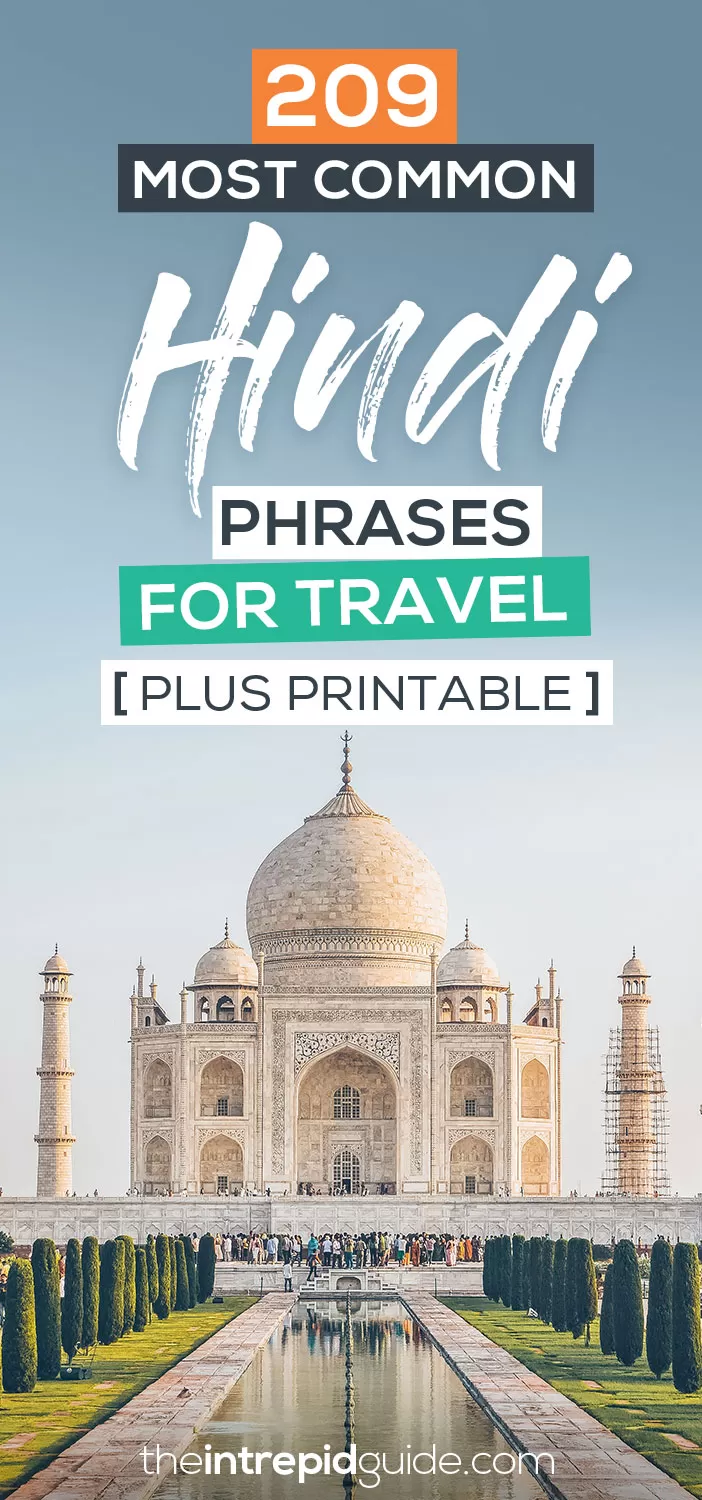
Sources / A big thanks to Babita Craig a professional Hindi teacher based in London. Having trained and taught for nine years at India’s famous Landour Language School, she set up Babita’s School of Hindi, London, in 2019, where she teaches a broad range of students in-person and online.
Want to know more about learning languages? Start here!
- What Type of Language Learner Are You? Your 4-Step Personalised Learning Plan
- 18 Unexpected Advantages & Health Benefits of Learning A Foreign Language
- How to Learn Languages Like Crazy, Even If You Have a Crazy Life [3-Step Method]
- 10 Pro Tips: How to Learn a Language with a Full-Time Job
- 44 Best Movies on Disney Plus for Learning Languages
- 6 Language Learning Tips: How to Learn a Language from Home
- How to Learn Your First Foreign Language in 8 Simple Steps: A Beginner’s Guide
- Essential Travel Phrases: How to be Travel Fluent in 10 Simple Steps
- 7 Reasons Why You Should Go on a Language Holiday
- 20 Top Language Learning Resources You Should Use
- 13 Ways to Seamlessly Integrate Language Learning into Your Daily Life
- 23 Cool Gifts for Language Learners They Will Actually Use and Love
- 11 Life-Changing Reasons Why You Should Learn a Language
- 42 beautiful Inspirational Quotes for Language Learners
- Language learning tips: 11 Polyglots Reveal The Secrets of Their Success
- Top 10 Best Ways to Learn a Language Better and Faster
- How to Learn Italian Before Your Trip
- Free Travel Phrase Guides
- How Many Languages are there in the World?
- Mondly Review: 10 Ways Mondly Drastically Improved My Language Learning
- 78 FREE Dictionaries to Learn a Language Fast [Free eBook Download]
- 22 KEY Travel Phrases That Will Transform Your Travels [Free Guide]
Over to you!
Which of these Hindi phrases did you find the most useful? Let me know in the comments section below or join me on social media to start a conversation. Thanks for reading and I hope you enjoyed this post. Like what you see? Subscribe using the form below to have all of my posts delivered directly to your email.
Michele creates language learning guides and courses for travel. What separates her from other instructors is her ability to explain complex grammar in a no-nonsense, straightforward manner using her unique 80/20 method. Get her free guide 9 reasons you’re not fluent…YET & how to fix it! Planning a trip? Learn the local language with her 80/20 method for less than the cost of eating at a tourist trap restaurant Start learning today!
How to Master Italian Phrases for Travel FAST!
25 funny french idioms and expressions you’ll love using.
I am so excited I found this website, I am chanting mantras and I just met a lady, I gave myself the rest of the year to learn all of this. Thanks you very much Michele for this amazing post, I will help you share and will text you later on your Instagram, Facebook, linked in or any other social I found you, You are fantastic.
Hola, estoy muy pero muy emocionado, encontre esta pagina y justamente estoy recitando mantras y conoci una chica y me he dado lo que resta del año para aprender todo esto. Gracias Michele, Te voy a contactar por la redes porque me interesa mucho tu contenido.
thank u sooo much!!! those phrases are really helpful… thanks a lot
My pleasure :) I’m so glad to hear that.
Leave a Comment Cancel Reply
Save my name, email, and website in this browser for the next time I comment.
This site uses Akismet to reduce spam. Learn how your comment data is processed .
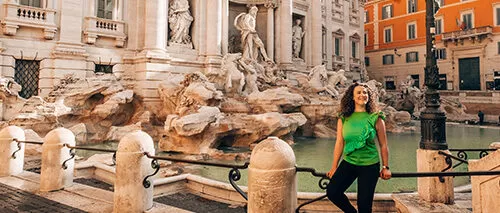
If you don't know where you are , how do you know where you're going? Find out how well you know Italian grammar today!

English Hindi Dictionary | अंग्रेज़ी हिन्दी शब्दकोश
The keyboard uses the ISCII layout developed by the Government of India. It is also used in Windows, Apple and other systems. There is a base layout, and an alternative layout when the Shift key is pressed. If you have any questions about it, please contact us.
- शब्द सहेजें
travel का हिन्दी अर्थ
Travel के हिन्दी अर्थ, संज्ञा .
- यात्रा का रचना
विशेषण
क्रिया .
- यात्रा होना
travel शब्द रूप
Travel की परिभाषाएं और अर्थ अंग्रेजी में, travel संज्ञा.
- traveling , travelling
यात्रा, ... सदस्यता लें
- "he enjoyed selling but he hated the travel"
- change of location
travel क्रिया
go , go , locomote , move
- "How fast does your new car go?"
- "news travelled fast"
- "The policemen went from door to door looking for the suspect"
- "The soldiers moved towards the city in an attempt to take it before night fell"
- "We travelled from Rome to Naples by bus"
- "We travelled North on Rte. 508"
jaunt , trip , trip
- "travel the oceans"
- move around
travel के समानार्थक शब्द
- go , locomote , move
- jaunt , trip
travel के विलोम
stay in place

Travel is the movement of people between distant geographical locations. Travel can be done by foot, bicycle, automobile, train, boat, bus, airplane, ship or other means, with or without luggage, and can be one way or round trip. Travel can also include relatively short stays between successive movements, as in the case of tourism.
यात्रा दो एक-दूसरे से दूरी रखने वाले भौगोलिक स्थानों के बीच लोगों के आने या जाने को कहते हैं। यात्रा पैदल, बाइसिकल, वाहन, विमान, नाव, बस, जलयान या अन्य साधन से, सामान के साथ या उसके बिना, करी जा सकती है। यात्रा के विभिन्न चरणों के बीच अलग-अलग स्थानों पर कुछ समय के लिए ठहरा भी जा सकता है। कुछ यात्राएँ एक ही दिशा में होती हैं जबकि अन्य में वापस प्रारम्भिक स्थान पर लौटा जाता है। यात्रा करने के कारणों में पर्यटन, मनोविनोद, अनुसंधान, व्यापार, तीर्थ-दर्शन, अभिगमन (कम्यूटिंग), एक स्थान छोड़कर किसी नये स्थान में बसने के लिए प्रवास, किसी स्थान पर आक्रमण करना या किसी युद्ध-स्थल से भागकर शरणार्थी होना, इत्यादि शामिल हैं।
travel के लिए अन्य शब्द?
travel के उदाहरण और वाक्य
travel के राइमिंग शब्द
अंग्रेजी हिन्दी अनुवादक
Words starting with
Travel का हिन्दी मतलब.
travel का हिन्दी अर्थ, travel की परिभाषा, travel का अनुवाद और अर्थ, travel के लिए हिन्दी शब्द। travel के समान शब्द, travel के समानार्थी शब्द, travel के पर्यायवाची शब्द। travel के विपरीत शब्द, travel के विलोम शब्द. travel के उच्चारण सीखें और बोलने का अभ्यास करें। travel का अर्थ क्या है? travel का हिन्दी मतलब, travel का मीनिंग, travel का हिन्दी अर्थ, travel का हिन्दी अनुवाद
"travel" के बारे में
travel का अर्थ हिन्दी में, travel का इंगलिश अर्थ, travel का उच्चारण और उदाहरण वाक्य। travel का हिन्दी मीनिंग, travel का हिन्दी अर्थ, travel का हिन्दी अनुवाद
SHABDKOSH Apps
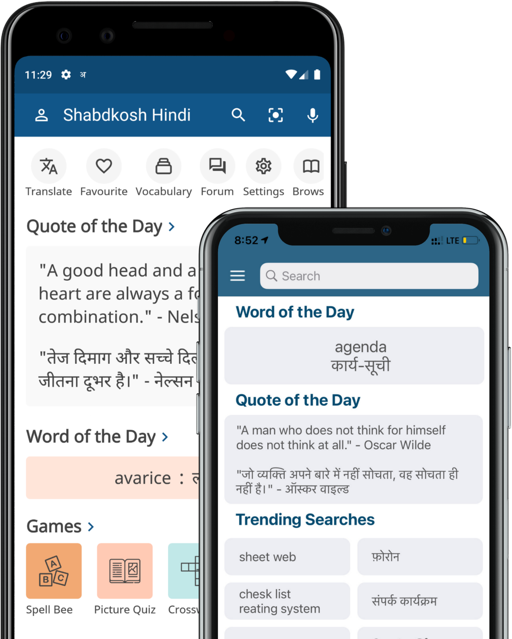
विज्ञापन-मुक्त अनुभव और भी बहुत कुछ।
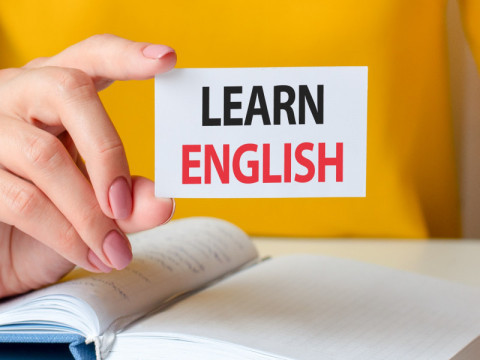
Using simple present tense
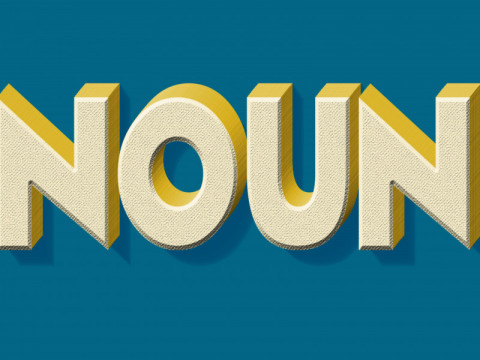
Types of nouns

Irregular Verbs
Our Apps are nice too!
Dictionary. Translation. Vocabulary. Games. Quotes. Forums. Lists. And more...

Vocabulary & Quizzes
Try our vocabulary lists and quizzes.
Vocabulary Lists
We provide a facility to save words in lists.
Basic Word Lists
Custom word lists.
You can create your own lists to words based on topics.
Login/Register
To manage lists, a member account is necessary.
Share with friends
Social sign-in.
Ad-free experience & much more
Translation

If you want to access full services of shabdkosh.com
Please help Us by disabling your ad blockers.
or try our SHABDKOSH Premium for ads free experience.
Steps to disable Ads Blockers.
- Click on ad blocker extension icon from browser's toolbar.
- Choose the option that disables or pauses Ad blocker on this page.
- Refresh the page.
Spelling Bee
Hear the words in multiple accents and then enter the spelling. The games gets challenging as you succeed and gets easier if you find the words not so easy.
The game will show the clue or a hint to describe the word which you have to guess. It’s our way of making the classic hangman game!
Antonym Match
Choose the right opposite word from a choice of four possible words. We have thousand of antonym words to play!
भाषा बदलें -
Language resources, संपर्क में रहें.
- © 2024 SHABDKOSH.COM, सर्वाधिकार सुरक्षित.
- प्रयोग की शर्तें
- निजी सूचना नीति
Liked Words
Shabdkosh Premium
SHABDKOSH Premium आज़माएं और प्राप्त करें
- विज्ञापन मुक्त अनुभव
- अनुवाद पर कोई सीमा नहीं
- द्विभाषी पर्यायवाची अनुवाद।
- सभी शब्दावली सूचियों और प्रश्नोत्तरी तक पहुंच।
- अर्थ कॉपी करें.
क्या आप पहले से ही एक प्रीमियम उपयोगकर्ता हैं?
Hindi Gyaani

टूरिज्म क्या है | What Is Tourism : पर्यटन क्या है
What Is Tourism In Hindi : ( टूरिज्म क्या है ) पर्यटन उन लोगों की गतिविधि को संदर्भित करता है जो अवकाश, व्यवसाय या अन्य उद्देश्यों के लिए अपने सामान्य वातावरण से बाहर यात्रा करते हैं और रहते हैं। इसमें ऐतिहासिक स्थलों, सांस्कृतिक स्थलों, प्राकृतिक आकर्षणों, कार्यक्रमों में भाग लेने और बाहरी मनोरंजक गतिविधियों में भाग लेने जैसी गतिविधियों की एक विस्तृत श्रृंखला शामिल है। पर्यटन एक महत्वपूर्ण उद्योग है जो वैश्विक अर्थव्यवस्था में योगदान देता है और रोजगार सृजित करता है, (Tourism kya hai) राजस्व उत्पन्न करता है और स्थानीय संस्कृतियों और परंपराओं को बढ़ावा देता है।
पर्यटन क्या है ?
पर्यटन का मतलब है यात्रा करना और विभिन्न स्थानों का दौरा करना। यह आम तौर पर मनोरंजन, आराम, शिक्षा, सांस्कृतिक अनुभव या व्यवसायिक उद्देश्यों के लिए किया जाता है। पर्यटन कई प्रकार के होते हैं, जैसे:
- सांस्कृतिक पर्यटन : इसमें लोग ऐतिहासिक स्थलों, संग्रहालयों, कला गैलरियों और सांस्कृतिक उत्सवों का दौरा करते हैं।
- प्राकृतिक पर्यटन : इसमें लोग प्राकृतिक स्थलों जैसे कि पर्वत, समुद्र तट, राष्ट्रीय उद्यान और वन्यजीव अभयारण्यों का दौरा करते हैं।
- साहसिक पर्यटन : इसमें ट्रेकिंग, राफ्टिंग, स्कीइंग, और पर्वतारोहण जैसी गतिविधियां शामिल होती हैं।
- स्वास्थ्य पर्यटन : इसमें लोग स्वास्थ्य सेवाओं और उपचारों के लिए यात्रा करते हैं, जैसे स्पा, आयुर्वेदिक चिकित्सा, और योग रिट्रीट्स।
- धार्मिक पर्यटन : इसमें लोग धार्मिक स्थलों और तीर्थयात्राओं पर जाते हैं।
पर्यटन का महत्व आर्थिक, सामाजिक और सांस्कृतिक रूप से भी बहुत होता है। यह स्थानीय अर्थव्यवस्था को बढ़ावा देता है, रोजगार के अवसर प्रदान करता है, और विभिन्न संस्कृतियों के बीच आपसी समझ और सद्भावना को बढ़ावा देता है।
Table of Content
Parts of tourism in india – पर्यटन के भाग, accommodation (आवास).
पर्यटन के इस भाग में यात्रियों को उनकी यात्रा के दौरान ठहरने के लिए स्थान उपलब्ध कराना शामिल है। आवास विकल्प बजट के अनुकूल हॉस्टल से लेकर लक्ज़री रिसॉर्ट्स और बीच में सब कुछ हैं।
Transportation (परिवहन)
परिवहन पर्यटन का एक अनिवार्य हिस्सा है, क्योंकि इसमें यात्रियों को एक स्थान से दूसरे स्थान पर ले जाना शामिल है। पर्यटकों के लिए परिवहन के साधनों में हवाई जहाज, ट्रेन, बसें, कार और नावें शामिल हैं।
Attractions (आकर्षण)
पर्यटन के इस हिस्से में वे विभिन्न आकर्षण शामिल हैं जिन्हें यात्री अपनी यात्रा के दौरान देखते हैं, जैसे संग्रहालय, ऐतिहासिक स्थल, थीम पार्क और प्राकृतिक स्थलचिह्न।
Food and Beverage (खान-पान)
पर्यटन के इस भाग में यात्रियों को उनकी यात्रा के दौरान खाने-पीने के विकल्प उपलब्ध कराना शामिल है। इसमें रेस्तरां, कैफे, बार और फूड स्टॉल शामिल हो सकते हैं।
Activities (गतिविधियाँ)
गतिविधियाँ पर्यटन का एक अनिवार्य हिस्सा हैं, क्योंकि वे यात्रियों को अपनी यात्रा के दौरान अवकाश गतिविधियों में संलग्न होने का अवसर प्रदान करती हैं। ये गतिविधियाँ साहसिक खेलों से लेकर लंबी पैदल यात्रा और रॉक क्लाइम्बिंग तक, खाना पकाने की कक्षाओं और संगीत प्रदर्शन जैसे सांस्कृतिक अनुभवों तक हो सकती हैं।
Events and Festivals (घटनाएँ और त्यौहार)
पर्यटन में कार्यक्रमों और उत्सवों में भाग लेना भी शामिल है, जो यात्रियों के लिए एक महत्वपूर्ण आकर्षण हो सकता है। इन घटनाओं के उदाहरणों में संगीत समारोह, सांस्कृतिक समारोह और खेल आयोजन शामिल हैं।
Tour Operators (टूर ऑपरेटर्स)
टूर ऑपरेटर्स वे कंपनियां होती हैं जो यात्रियों के लिए टूर आयोजित करने में माहिर होती हैं। वे परिवहन और आवास से लेकर गतिविधियों और आकर्षणों तक यात्रा के सभी पहलुओं को संभालते हैं।
Travel Services (यात्रा सेवाएँ)
पर्यटन के इस भाग में वे विभिन्न सेवाएँ शामिल हैं जिनकी यात्रियों को यात्रा के दौरान आवश्यकता होती है, जैसे यात्रा बीमा, वीज़ा सेवाएँ और मुद्रा विनिमय।
संक्षेप में, पर्यटन एक जटिल उद्योग है जिसमें कई अलग-अलग हिस्से शामिल हैं। इन विभिन्न भागों को समझकर, हम पर्यटन उद्योग और वैश्विक अर्थव्यवस्था पर इसके प्रभाव की बेहतर समझ प्राप्त कर सकते हैं।

पर्यटन उन लोगों की गतिविधि को संदर्भित करता है जो अवकाश, व्यवसाय या अन्य उद्देश्यों के लिए अपने सामान्य वातावरण से बाहर यात्रा करते हैं और रहते हैं। इसमें ऐतिहासिक स्थलों, सांस्कृतिक स्थलों, प्राकृतिक आकर्षणों, कार्यक्रमों में भाग लेने और बाहरी मनोरंजक गतिविधियों में भाग लेने जैसी गतिविधियों की एक विस्तृत श्रृंखला शामिल है।
पर्यटन एक महत्वपूर्ण उद्योग है जो वैश्विक अर्थव्यवस्था में योगदान देता है। यह रोजगार सृजित करता है, राजस्व उत्पन्न करता है, और स्थानीय संस्कृतियों और परंपराओं को बढ़ावा देता है। कई देश और क्षेत्र आय के एक प्रमुख स्रोत के रूप में पर्यटन पर बहुत अधिक निर्भर करते हैं, विशेष रूप से प्राकृतिक, सांस्कृतिक या ऐतिहासिक आकर्षण वाले पर्यटन पर।
पर्यटकों को उनकी यात्रा के उद्देश्य के आधार पर विभिन्न श्रेणियों में वर्गीकृत किया जा सकता है, जैसे अवकाश यात्री, व्यापार यात्री, साहसिक यात्री, पर्यावरण-पर्यटक और सांस्कृतिक पर्यटक। प्रत्येक श्रेणी की अलग-अलग ज़रूरतें और प्राथमिकताएँ होती हैं, जिन्हें सर्वोत्तम संभव अनुभव प्रदान करने के लिए पर्यटन उद्योग को पूरा करना चाहिए।
पर्यटन के कई सकारात्मक प्रभाव हैं, जिनमें आर्थिक लाभ, सांस्कृतिक आदान-प्रदान और वैश्विक समझ और शांति को बढ़ावा देना शामिल है। हालाँकि, इसके कुछ नकारात्मक प्रभाव भी हैं, जैसे कि भीड़भाड़, पर्यावरणीय गिरावट और सांस्कृतिक समरूपता। इन नकारात्मक प्रभावों को कम करने और यह सुनिश्चित करने के लिए सतत पर्यटन अभ्यास महत्वपूर्ण हैं कि पर्यटन पर्यटकों और मेजबान समुदायों दोनों के लिए एक सकारात्मक शक्ति है।
संक्षेप में, पर्यटन एक आवश्यक उद्योग है जिसमें महत्वपूर्ण आर्थिक और सामाजिक लाभ पैदा करने की क्षमता है। स्थायी प्रथाओं को अपनाकर और जिम्मेदार यात्रा को बढ़ावा देकर, हम यह सुनिश्चित कर सकते हैं कि पर्यटन शामिल सभी लोगों के लिए एक सकारात्मक शक्ति बना रहे।
Types of Tourism (पर्यटन के प्रकार)
Leisure tourism (आराम पर्यटन).
इस प्रकार के पर्यटन में आराम और आनंद के लिए यात्रा करना शामिल है, आमतौर पर छुट्टी या छुट्टी के लिए। इसमें दर्शनीय स्थलों की यात्रा, धूप सेंकना और मनोरंजक गतिविधियों में भाग लेने जैसी गतिविधियाँ शामिल हैं।
Business Tourism (बिजनेस टूरिज्म)
बिजनेस टूरिज्म में काम से संबंधित उद्देश्यों के लिए यात्रा करना शामिल है, जैसे सम्मेलनों, बैठकों या व्यापार शो में भाग लेना। व्यावसायिक यात्रियों की अक्सर विशिष्ट ज़रूरतें होती हैं, जैसे कि उच्च गति का इंटरनेट, बैठक की सुविधाएँ और व्यावसायिक जिले से निकटता।
Adventure Tourism (साहसिक टूरिज्म)
साहसिक पर्यटन में लंबी पैदल यात्रा, पर्वतारोहण और जल क्रीड़ा जैसी साहसिक गतिविधियों में शामिल होने के लिए यात्रा करना शामिल है। इस प्रकार के पर्यटन को आमतौर पर शारीरिक चुनौतियों, जोखिमों और अन्वेषण की भावना की विशेषता होती है।

Cultural Tourism (सांस्कृतिक पर्यटन)
सांस्कृतिक पर्यटन में विभिन्न संस्कृतियों, परंपराओं और जीवन के तरीकों का अनुभव करने के लिए यात्रा करना शामिल है। इसमें संग्रहालयों, ऐतिहासिक स्थलों का दौरा करने और सांस्कृतिक कार्यक्रमों और त्योहारों में भाग लेने जैसी गतिविधियाँ शामिल हैं।
Eco-Tourism (इको-टूरिज्म)
इको-टूरिज्म में पर्यावरण और वन्य जीवन के बारे में जानने और उसकी सराहना करने के लिए प्राकृतिक क्षेत्रों की यात्रा करना शामिल है। इस प्रकार का पर्यटन जिम्मेदार यात्रा प्रथाओं, सतत पर्यटन विकास और संरक्षण प्रयासों पर जोर देता है।
Health and Wellness Tourism (स्वास्थ्य और कल्याण पर्यटन)
स्वास्थ्य और कल्याण पर्यटन में किसी के शारीरिक, मानसिक या आध्यात्मिक कल्याण में सुधार के उद्देश्य से यात्रा करना शामिल है। इसमें विज़िटिंग स्पा, योग रिट्रीट और वेलनेस सेंटर जैसी गतिविधियाँ शामिल हैं।
Religious Tourism (धार्मिक पर्यटन)
धार्मिक पर्यटन में धार्मिक स्थलों की यात्रा करना और धार्मिक समारोहों और तीर्थयात्राओं में भाग लेना शामिल है। इस प्रकार का पर्यटन अक्सर आध्यात्मिक या धार्मिक विश्वासों से प्रेरित होता है।
Sports Tourism (खेल पर्यटन)
खेल पर्यटन में ओलंपिक, विश्व कप, या अन्य प्रमुख खेल आयोजनों जैसे खेल आयोजनों में भाग लेने या देखने के लिए यात्रा करना शामिल है।
संक्षेप में, पर्यटन एक विविध उद्योग है जो रुचियों और प्रेरणाओं की एक विस्तृत श्रृंखला को पूरा करता है। इन विभिन्न प्रकार के पर्यटन को समझने से यात्रियों और पर्यटन पेशेवरों को विशिष्ट आवश्यकताओं और प्राथमिकताओं को पूरा करने वाले अनुकूलित यात्रा अनुभव बनाने में मदद मिल सकती है।
History of Tourism : पर्यटन के इतिहास
एक आधुनिक परिघटना के रूप में पर्यटन ( Tourism ) को अक्सर यूरोप के ग्रैंड टूर में खोजा जाता है, जो 17वीं शताब्दी में धनी और कुलीन अंग्रेजी के बीच लोकप्रिय हुआ था। ग्रैंड टूर यूरोप की एक बहु-वर्षीय यात्रा थी जिसका उद्देश्य युवा सज्जनों के लिए शिक्षा और सांस्कृतिक संवर्धन प्रदान करना था।
हालाँकि, पर्यटन की जड़ों को इतिहास में बहुत आगे तक खोजा जा सकता है। प्राचीन यूनानियों और रोमियों को अवकाश और स्वास्थ्य उद्देश्यों के लिए यात्रा करने के लिए जाना जाता था, वे बाथ के हीलिंग स्प्रिंग्स और रोम के थर्मल बाथ जैसी जगहों पर जाते थे। सिल्क रोड, जो यूरोप और एशिया को जोड़ता था, पूरे इतिहास में यात्रियों और व्यापारियों के लिए भी एक प्रमुख मार्ग था।
मध्य युग में, तीर्थ यात्रा पर्यटन का एक महत्वपूर्ण रूप था। ईसाइयों ने यरूशलेम, रोम और अन्य पवित्र स्थलों की यात्रा की, जबकि मुसलमानों ने मक्का की यात्रा की। 11वीं सदी में शुरू हुए धर्मयुद्ध ने भी पवित्र भूमि की यात्रा को बढ़ावा दिया।
19वीं सदी में आधुनिक पर्यटन ( Tourism ) उद्योग ने आकार लेना शुरू किया। रेलवे और स्टीमशिप जैसे परिवहन बुनियादी ढांचे के विकास ने यात्रा को अधिक सुलभ और सस्ता बना दिया है। इससे व्यापक पर्यटन का उदय हुआ, जहां बड़ी संख्या में लोगों ने लोकप्रिय स्थलों की यात्रा की।
20वीं शताब्दी की शुरुआत में, अवकाश के समय में वृद्धि और समृद्धि में वृद्धि के साथ, पर्यटन का विकास जारी रहा। 1930 के दशक में व्यावसायिक विमानन की शुरुआत ने पर्यटन के दायरे को और बढ़ा दिया, जिससे दुनिया भर के दूर-दराज के स्थलों की यात्रा करना संभव हो गया।
द्वितीय विश्व युद्ध के बाद के युग में, पर्यटन एक प्रमुख उद्योग बन गया, विशेष रूप से यूरोप और उत्तरी अमेरिका में। मध्यम वर्ग की वृद्धि और अवकाश के समय में वृद्धि के कारण यात्रा में वृद्धि हुई, विशेष रूप से छुट्टी और मनोरंजन के उद्देश्य से।
आज, पर्यटन एक महत्वपूर्ण वैश्विक उद्योग है, जो खरबों डॉलर का राजस्व पैदा करता है और दुनिया भर में लाखों लोगों को रोजगार देता है। यह सांस्कृतिक आदान-प्रदान, आर्थिक विकास और व्यक्तिगत विकास के अवसर प्रदान करते हुए आधुनिक जीवन का एक अनिवार्य हिस्सा बन गया है।

Glossary of Tourism : पर्यटन शब्दावली
एक जगह जहां यात्री रात भर रुक सकते हैं, जैसे कि होटल, छात्रावास, या अवकाश किराया।
All-inclusive (सर्व-समावेशी)
एक प्रकार का अवकाश पैकेज जिसमें सभी भोजन, पेय और गतिविधियाँ शामिल हैं।
Backpacking (बैकपैकिंग)
बजट यात्रा का एक रूप जहां यात्री अपना सामान बैकपैक में रखते हैं और हॉस्टल या अन्य कम लागत वाले आवासों में रहते हैं।
Cruise (क्रूज)
एक छुट्टी जिसमें विभिन्न गंतव्यों के लिए जहाज से यात्रा करना शामिल है।
Destination (गंतव्य स्थान)
वह स्थान जहाँ यात्री मनोरंजन के लिए जाते हैं, जैसे कोई शहर, समुद्र तट या थीम पार्क।
Ecotourism (इकोटूरिज्म)
प्राकृतिक क्षेत्रों की जिम्मेदार यात्रा जो पर्यावरण का संरक्षण करती है और स्थानीय समुदायों का समर्थन करती है।
Guidebook (गाइडबुक)
एक किताब जो एक गंतव्य के बारे में जानकारी प्रदान करती है, जिसमें आवास, रेस्तरां और गतिविधियों के लिए सिफारिशें शामिल हैं।
Homestay (होमस्टे)
एक प्रकार का आवास जहां यात्री अपने घर में एक स्थानीय परिवार के साथ रहते हैं।
Itinerary (यात्रा कार्यक्रम)
एक यात्रा की योजना जिसमें दिनांक, गंतव्य और गतिविधियाँ शामिल हैं।
Package tour (पैकेज टूर)
एक छुट्टी पैकेज जिसमें परिवहन, आवास और गतिविधियाँ शामिल हैं।
FAQ – What Is Tourism इन : पर्यटन क्या है
पर्यटन क्या है.
पर्यटन अवकाश, व्यवसाय या अन्य उद्देश्यों के लिए गंतव्यों की यात्रा करने का कार्य है। इसमें दर्शनीय स्थलों की यात्रा, आकर्षणों का भ्रमण और मनोरंजक गतिविधियों में शामिल होने जैसी गतिविधियाँ शामिल हैं।
पर्यटन क्यों महत्वपूर्ण है?
पर्यटन कई कारणों से महत्वपूर्ण है। यह आर्थिक विकास को प्रोत्साहित कर सकता है, रोजगार सृजित कर सकता है, सांस्कृतिक आदान-प्रदान को बढ़ावा दे सकता है और स्थानीय समुदायों का समर्थन कर सकता है। यह व्यक्तिगत विकास और आनंद के अवसर भी प्रदान कर सकता है।
पर्यटन के विभिन्न प्रकार क्या हैं?
सांस्कृतिक पर्यटन, साहसिक पर्यटन, इको-टूरिज्म, चिकित्सा पर्यटन, और बहुत कुछ सहित पर्यटन के कई अलग-अलग प्रकार हैं। प्रत्येक प्रकार का पर्यटन यात्रा के एक विशेष पहलू पर ध्यान केंद्रित करता है, जैसे कि विभिन्न संस्कृतियों का अनुभव करना, बाहरी गतिविधियों में शामिल होना, या चिकित्सा उपचार की तलाश करना।
कुछ लोकप्रिय पर्यटन स्थल कौन से हैं?
कुछ लोकप्रिय पर्यटन स्थलों में पेरिस, न्यूयॉर्क शहर, रोम, टोक्यो और बाली शामिल हैं। ये गंतव्य कई प्रकार के आकर्षण प्रदान करते हैं, ऐतिहासिक स्थलों से लेकर प्राकृतिक आश्चर्यों से लेकर सांस्कृतिक अनुभवों तक।
मैं बजट पर यात्रा कैसे कर सकता हूं?
बजट पर यात्रा करने के कई तरीके हैं, जैसे हॉस्टल या अवकाश किराया में रहना, सार्वजनिक परिवहन का उपयोग करना और पर्यटन स्थलों के बजाय स्थानीय रेस्तरां में भोजन करना। आप उड़ानों, रहने की जगह और गतिविधियों पर सौदे भी देख सकते हैं।
- पीरियड्स के कितने दिन बाद सेक्स करना चाहिए? | Period ke kitne din baad sex karna chahiye मासिक धर्म या पीरियड्स महिलाओं के जीवन का एक स्वाभाविक और आवश्यक हिस्सा है। हर महिला का मासिक चक्र अलग होता है, और इसी कारण से सवाल उठता है कि “पीरियड्स के कितने दिन बाद सेक्स करना चाहिए?” यह सवाल उन महिलाओं और कपल्स के लिए अहम हो सकता है जो परिवार नियोजन या गर्भधारण
- Jasmin Bhasin Ke Bare Mein Jankari | जैस्मिन भसीन के बारे में Jasmin Bhasin Ke Bare Mein – टीवी और फिल्म इंडस्ट्री में नाम कमाना जितना कठिन है, उतना ही स्थाई सफलता प्राप्त करना चुनौतीपूर्ण होता है। जैस्मिन भसीन उन चुनिंदा अदाकाराओं में से हैं जिन्होंने अपने टैलेंट और मेहनत के दम पर इस कठिन रास्ते को आसानी से पार किया है। चाहे वह रोमांटिक टीवी शो
- Nimrit Kaur Ahluwalia Biography In Hindi | निमृत कौर के बारे में निमृत कौर अहलूवालिया आज भारतीय टेलीविज़न इंडस्ट्री का एक जाना-माना नाम हैं। अपनी अदाकारी और खूबसूरती के दम पर उन्होंने दर्शकों का दिल जीत लिया है। इस ब्लॉग पोस्ट में हम निमृत की जिंदगी, करियर, और उनकी उपलब्धियों पर विस्तार से बात करेंगे। निमृत कौर अहलूवालिया जीवन परिचय नाम निमृत कौर अहलूवालिया जन्म 11 दिसंबर
- महिला सशक्तिकरण (Women Empowerment) | Mahila Sashaktikaran महिला सशक्तिकरण (Women Empowerment) एक ऐसा विषय है जो आज के समय में बहुत महत्वपूर्ण हो गया है। यह सिर्फ एक शब्द नहीं, बल्कि एक विचारधारा है जो महिलाओं को उनके अधिकार, सम्मान, और समानता की ओर प्रेरित करता है। यह प्रक्रिया महिलाओं को न केवल अपने जीवन के बारे में निर्णय लेने की स्वतंत्रता
- Mahilao Ke Liye Ghar Baithe Rojgar | महिलाओ के लिए घर बैठे रोजगार Mahilao Ke Liye Ghar Baithe Rojgar – COVID -19 महामारी में दो साल, घर से स्थायी काम का विकल्प भारत में महिला कर्मचारियों के लिए काम की गतिशीलता को बदल रहा है। विविधता और समावेशन फर्म अवतार द्वारा ईटी के लिए विशेष रूप से एक साथ रखे गए शोध और डेटा से पता चलता है

Which language do you want to learn?

Hindi Vocabulary for Travel and Tourism

Traveling to a Hindi-speaking region can be an exhilarating experience. Whether you’re a globe-trotter or a first-time tourist, getting familiar with the local language can greatly enhance your trip. Learning some essential Hindi vocabulary for travel and tourism will not only help you navigate through cities and villages, but it will also allow you to connect more deeply with the culture and its people. Let’s dive into some key words and phrases that you should add to your travel lexicon.

Yaatraa Meaning: Journey, travel Mujhe yaatraa karna bahut pasand hai. Translation: I love to travel a lot.
Paryatan Meaning: Tourism Bharat mein paryatan udyog bahut bada hai. Translation: The tourism industry in India is very large.
Havaai Adda Meaning: Airport Kya aap mujhe havaai adda tak chhod denge? Translation: Could you drop me off at the airport?
Visa Meaning: Visa (the document) Kya aapke paas Amerika jaane ka visa hai? Translation: Do you have a visa to go to America?
Hotel Meaning: Hotel Kya aapne hotel mein kamra book kar liya? Translation: Have you booked a room in the hotel?
Reservation Meaning: Reservation, booking Mujhe ek table ka reservation chahiye. Translation: I need a reservation for a table.
Pravasi Meaning: Tourist Yahaan har saal laakhon pravasi aate hain. Translation: Millions of tourists come here every year.
Train Meaning: Train Hum kal raat ki train se jaayenge. Translation: We will go by the train tomorrow night.
Bus Meaning: Bus Bus stand kis disha mein hai? Translation: In which direction is the bus stand?
Taxi Meaning: Taxi Kya aap taxi bulane mein meri madad kar sakte hain? Translation: Could you help me call a taxi?
Naksha Meaning: Map Kya aapke paas is sheher ka naksha hai? Translation: Do you have a map of this city?
Sightseeing Meaning: Sightseeing Kal hum puri din sightseeing ke liye jaayenge. Translation: Tomorrow, we will go sightseeing the entire day.
Guide Meaning: Guide Kya aap hamein tour guide ki vyavastha kar sakte hain? Translation: Can you arrange a tour guide for us?
Samay Meaning: Time Kripaya aagaman ka samay bataiye. Translation: Please tell me the arrival time.
Pradarshani Meaning: Exhibition Kya hum pradarshani dekhne chale? Translation: Shall we go to see the exhibition?
Mandir Meaning: Temple Mandir ke darshan ke baad hum khaana khayenge. Translation: We will eat after visiting the temple.
Souvenir Meaning: Souvenir Mujhe yahan se ek souvenir kharidna hai. Translation: I want to buy a souvenir from here.
Thakaan Meaning: Fatigue Puri yaatra ke baad, thakaan mahsoos ho rahi hai. Translation: After the entire journey, I’m feeling fatigued.
Sanskruti Meaning: Culture Bharatiya sanskruti bahut samrichh aur vividhatalaabh hai. Translation: Indian culture is very rich and diverse.
By familiarizing yourself with these Hindi words, your travel and tourism experience in Hindi-speaking territories will certainly be enriched. Don’t hesitate to use them when conversing with locals or during your adventures. Happy travels और यात्रा मंगलमय हो (May your journey be auspicious)!
Learn a Language With AI 5x Faster

Talkpal is AI-powered language tutor. Learn 57+ languages 5x faster with revolutionary technology.
LEARN LANGUAGES FASTER WITH AI
Learn 5x faster.


Common Useful Hindi Phrases for Travel Destinations in India

Planning to spend your vacation in India? Well, learning Hindi should be your top-most priority before visiting the land of diversity. In case you’ve been wondering where to begin, allow us to introduce you to HindiPod101.com , the biggest platform for mastering Hindi. HindiPod101 is the best language travel guide in Hindi even for beginners, and today we’ll be teaching you some useful Hindi phrases for travel!
Traveling to a foreign land is one of the most remarkable things in life. And yet, the thought of it makes us all a little nervous. The biggest hurdle that gives us cold feet is the language problem. For instance, if India is on your tour list , communicating with the natives will be challenging if you don’t speak or understand Hindi.
And although Hindi is spoken mainly in the northern part of the country , other states are also well-versed with the language. Whether you’re about to travel in Hindi-speaking areas or explore the southern region, knowing some essential Hindi travel phrases is a sure-shot way to have a safe and gratifying journey.
So, brace yourself for a quick language ride and let’s make this trip more enjoyable with some useful Hindi phrases for travel in India . You’ll be so glad that you learned the most common Hindi travel phrases!
Table of Contents
- Perks of Knowing Hindi in India
- Essential Hindi Phrases for Traveling in India
- How to Use HindiPod101 and Learn Hindi Travel Phrases!

1. Perks of Knowing Hindi in India

Being a foreigner, it’s not necessary for you to be well-versed in Hindi language travel phrases. However, the knowledge of basic Hindi conversation for tourists has several advantages.
- General Needs: Spending a few weeks in another country, you just can’t avoid the day-to-day needs. In India, greeting the local people like a native is the best way to solve that problem. Thus, basic greeting Hindi phrases when travelling to India are essential.
- Eateries and Shopping Spots: By learning some simple travel phrases in Hindi, food lovers and shopaholics can easily track all the hot spots in the market. Knowing the right Hindi words for traveling purposes is an easy and economical way to gorge on your favorite Indian cuisine or shop to your heart’s content.
- Bargaining: Yes, in India, when it comes to foreign travelers, the vendors try all their might to get the maximum profit from sales. If you know the basic Indian phrases for tourists, you’ll gain the upper hand in the general bargaining process.
- Finding Locations: No Google search is good enough to provide you with as fine and accurate suggestions as the local people. Understanding directions and routes in Hindi becomes an effortless task as you learn useful Indian phrases when traveling.
- Bonding with the Locals: Hindi words related to travel and staying in the country aren’t just about surviving the trip. Speaking the local language is an effective gesture to impress and bond with the natives. It shows your warmth and respect toward their culture. Check out these amazing Hindi pronunciation tips for speaking like a native .
- Emergency: In case of emergencies, such as a health issue, accident, theft, etc., knowledge of Hindi travel common phrases goes a long way. In urgent situations, it can get you help in as little time as possible.
2. Essential Hindi Phrases for Traveling in India
Honestly, listing the relevant Hindi phrases for a tourist in India can be an endless task. Nonetheless, we’ve collected the best Hindi travel phrases for you to make your trip smooth and hassle-free.
Check out the following sets of situations and learn the related Hindi language travel phrases for each of them. Once you’ve spent some time practicing, you’ll be able to speak Hindi travel words and phrases like a native!
1- Greetings and Other Basic Expressions
India is a country where people love to socialize. Even strangers may smile to each other. In such a vibrant culture as India , a seemingly ordinary gesture of greeting is enough to break the ice. Here are some of the most popular words and phrases in Hindi to help you gel with the locals! For easier learning, refer to our section on Hindi alphabets .
1.) Greetings
- नमस्ते ( NamaSTe ) Hello
- नमस्कार ( NamaSkaar ) Hello
- आप कैसे हैं / कैसी हैं? ( aap kaiSe hain / kaiSii hain? ) How are you?
In India, people follow a particular set of body language and hand gestures while saying “hello” in Hindi. Visit our Indian greetings and body language page on HindiPod101.com and find out the proper way to introduce yourself and start a friendly conversation .
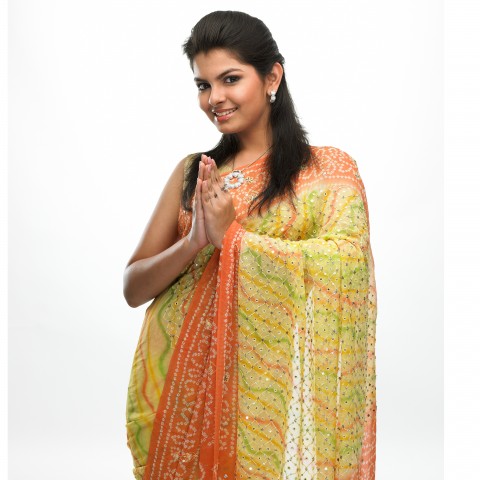
2.) Basic Manners
- शुक्रिया ( sukriyaa ) Thank you
- धन्यवाद ( DHaNyavaaD ) Thank you
- माफ़ कीजिये ( maaf kiijiye ) Excuse me / Sorry
- कृपया ( kripayaa ) Please
3.) Common Sentences
- मेरा नाम मोनिका है। ( meraa Naam moNikaa hai. ) My name is Monica.
- आपका क्या नाम है? ( aapakaa kyaa Naam hai? ) What’s your name?
- मैं ठीक हूँ। ( main thiik huun. ) I am good.
- आप कैसे /कैसी हैं? ( aap kaiSe hain / kaiSii hain? ) How are you?
- कोई बात नहीं। ( koii baaT Nahiin. ) It’s okay. / No problem.
- आप से मिलकर ख़ुशी हुई। ( aap Se miLakar khusii huii. ) A pleasure to meet you.
Useful Related Words
- नाम ( Naam ) Name
- मैं ( main ) I
- आप ( aap ) You
- हाँ ( hā̃ ) Yes
- नहीं ( Nahiin ) No
- ठीक है ( thiik hai ) Okay
2- Using a Public Transport
In small cities, where everything is within a range of a few kilometers, the common public transports include auto rickshaws and rickshaws. Whereas in metropolitan cities, metros, local buses , autos, cabs, and taxis keep the towns running! To help you navigate these transportation systems, check out these Hindi words and phrases for travelers to India.

- मेट्रो स्टेशन ले चलो। (metro StesaN Le caLo. ) Take me to the metro station, please.
- रेलवे स्टेशन / बस स्टेशन जाना है। ( reLave StesaN / baS StesaN jaaNaa hai. ) Railway station, please.
- अगला स्टॉप कितना दूर है? ( agaLaa Staup kiTaNaa Duur hai? ) How far is the next stop?
- टिकट किधर मिलेगा? (tikat kiDHar miLegaa? ) Where can I get the ticket?
- मेरी सुबह की ट्रेन है। ( merii Subah kii treN hai. ) I have an early morning train.
- कितना वक़्त लगेगा? ( kiTaNaa vaqT Lagegaa? ) How long will it take?
- मुंबई का टिकट चाहिए। ( mumbaii kaa tikat caahiye. ) A ticket to Mumbai, please.
- मुझे कहाँ उतरना चाहिए? ( mujhe kahaan uTaraNaa caahiye? ) Where should I get off?
Now for a tip from our India travel guide: India is a heavily populated country. So, be prepared for the rush and traffic to slow you down. Keep sufficient time in hand to reach the airport / bus station / railway station. On average, leaving thirty to forty-five minutes earlier than the usual time will save you a lot of hassle.
- सुबह ( Subah ) Morning
- रात ( raaT ) Night
- दोपहर ( Dopahar ) Afternoon
- कब ( kab ) When
- समय ( Samay ) Time
3- Shopping and Bargaining
Bargaining is the heartbeat of typical Indian markets. It goes on all the time. Unless you’re in a mall or a branded store with fixed prices, the local shops can really test your spending limits.
More often than not, vendors and shopkeepers try to get as much as they can from foreigners. Sometimes, the quoted price may be double or triple the original rate.
Your bargaining capacity becomes manifold just by uttering some common shopping phrases in Hindi . Using these basic Hindi words for travelers to India is an effective way to tell the sellers that you understand how things work in the local market and they better stop trying to fool you!
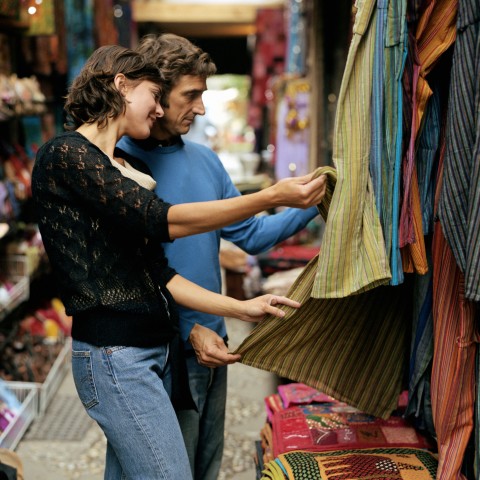
- कितना हुआ? ( kiTaNaa huaa? ) How much?
- क्या दाम है? ( kyaa Daam hai? ) What’s the price?
- इसका दाम कम कीजिए। ( iSakaa Daam kam kiijiye. ) Please, lower the price.
- सही दाम लगाओ। ( Sahii Daam Lagaao. ) Tell me the correct price.
- मुझे यह चाहिए। ( mujhe yah caahiye. ) I want this.
- मुझे यह नहीं चाहिए। ( mujhe yah Nahiin caahiye. ) I don’t want this.
- ये सामान ख़राब है। ( ye SaamaaN kharaab hai. ) This stuff has defects.
- इसे बदल दीजिये। ( iSe baDaL Dijiiye. ) Please, change this.
- छोटा / बड़ा नाप चाहिए। ( chotaa / badaa Naap caahiye. ) Give me a smaller / larger size.
- क्रेडिट कार्ड चलेगा? ( kredit kaard caLega? ) Can I use a credit card?
- दाम ( Daam ) Rate / Price
- पैसे ( paiSe ) Money / Rupees
- बदलना ( baDaLaNaa ) Change
- नया ( Nayaa ) New
- पुराना ( puraaNaa ) Old
- ख़राब ( kharaab ) Defective
- छोटा ( chotaa ) Small
- बड़ा ( badaa ) Large
- नाप ( Naap ) Size
Indians have a habit of using Hindi numbers while counting money, telling the price, bargaining, and even asking what size fits you well. With HindiPod101.com, you can learn and memorize the Hindi Numbers and up your bargain game.
4- Dining at a Restaurant
Authentic Indian cuisine is worth every bite. From vegetarian dishes to non-veg delicacies , Indian food is a melting pot of herbs and spices , all with a touch of love.
When visiting a fine restaurant or hotel that you’re staying in, speaking Hindi is optional. Most hotel staff are fluent in English and converse in the same language. So, you may not need to worry about speaking Hindi at your hotel.
However, if you stop by a roadside eatery and wish to have a few bites there, the basic Hindi travel words with meanings below will prove to be quite helpful.
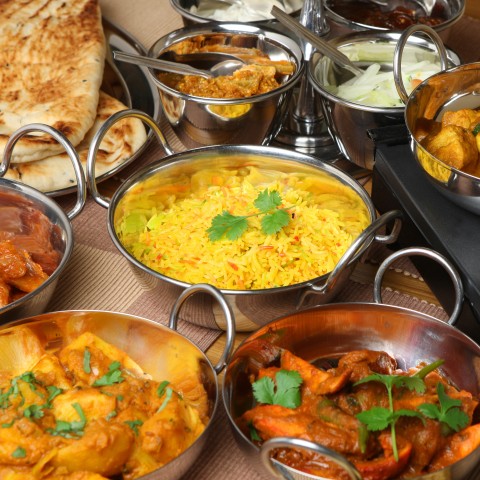
With these Hindi words, one can easily place an order at a local restaurant , ask for the bill , and more.
- मैं शाकाहारी हूँ। ( main saakaahaarii huun. ) I am a vegetarian.
- मैं मांसाहारी हूँ। ( main maanSaahaarii huun. ) I am a non-vegetarian.
- एक चाय / कॉफ़ी चाहिए। ( ek caay / kaufii caahiye. ) One tea / coffee, please.
- ये बहुत स्वादिष्ट है। ( ye bahuT SvaaDist hai. ) It’s delicious.
- तीखा कम रखियेगा। ( Tiikhaa kam rakhiyegaa. ) Please, make it less spicy.
- बिल ले आइये। ( biL Le aaiye. ) Bill, please.

- मुझे और रोटियाँ चाहिए। ( mujhe aur rotiyaan caahiye. ) I want more chapatis.
- दो लोग हैं। ( Do Log hain. ) Table for two, please.
- क्या आप क्रेडिट कार्ड लेते हैं? ( kyaa aap kredit kaard LeTe hain? ) Do you accept credit cards?
It’s common to pay in cash when eating at a small restaurant. Credit cards are usually accepted at expensive or moderately expensive eating places.
The most popular beverage in India is tea ( caay ). It contains tea leaves, sugar, and equal parts milk and water. Indians love to have their tea on the sweeter side. So, if you don’t have a sweet tooth, make sure to mention that while you order the tea.
Spices and chilies are the soul of every Indian food. To non-natives, Indian food may taste quite spicy and hot. To be on the safer side, it’s better to tell the waiters your preferences beforehand.
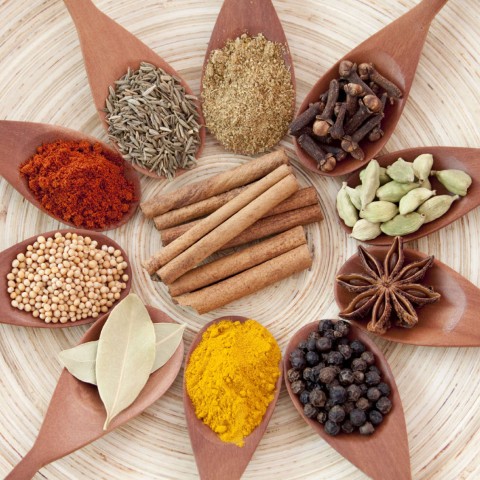
- खाना ( khaaNaa ) Lunch / Dinner / Meal / Food
- पानी ( paaNii ) Water
- चाय ( caay ) Tea
- दूध ( DuuDH ) Milk
- नाश्ता ( NaasTaa ) Breakfast
- अंडा ( aNdaa ) Egg
- फल ( phaL ) Fruits
- सब्ज़ी ( Sabzii ) Vegetable
- रोटी ( rotii ) Chapati / Indian flat bread
- चावल ( caavaL ) Rice
- मसाला ( maSaaLaa ) Spice
- कम ( kam ) Less
- ज़्यादा ( zyaaDaa ) More
- मीठा ( miithaa ) Sweet
- मिठाई ( mithaaii ) Dessert
5- For Directions and Routes

Most of the cities and towns in the country aren’t organized. So, finding the routes all by yourself can be tricky business. Nonetheless, people in India are helpful and friendly. They’ll be more than happy to help you with directions . But, how to ask for directions when a large segment of the population doesn’t speak English?
The answer is simple. Learn these basic phrases and you’re good to go! (They may be some of the most important Hindi words for tourists in India!)
- बाथरूम कहाँ / किधर है? ( baaTHaruum kahaan / kiDHar hai? ) Where is the toilet?
- ताज महल कितनी दूर है? ( Taaj mahaL kiTaNii Duur hai? ) How far is the Taj Mahal?
- कनॉट प्लेस के लिए कौन-सा रास्ता है? ( kaNaut pLeS ke Liye kauN-Sa raaSTaa hai? ) What is the route to Connaught Place?
- दाएं जाना है। ( Daayen jaaNaa hai. ) Go right.
- बाएँ मुड़ना है। ( baayen mudaNaa hai. ) Turn left.
- सामने / सीधे चले जाइये। ( SaamaNe / SiiDHe caLe jaaiye. ) Go straight.
- दाएं ( Daayen ) Right
- बाएं ( baayen ) Left
- सामने ( SaamaNe ) Front
- सीधे ( SiiDHe ) Straight
- सड़क ( Sadak ) Road
- मोड़ ( mod ) Turn
- किधर ( kiDHar ) Which side
- कहाँ ( kahaan ) Where
- अंदर ( aNDar ) Inside
- बाहर ( baahar ) Outside
- पीछे ( piiche ) Back / Behind
6- In Case of Emergency

This section needs no explanation. When you’re in another part of the world, learning the local language, or at least some essential emergency phrases in Hindi , can save you from big trouble. Below is a list of some Hindi phrases to use in case of emergency.
- मुझे मदद चाहिए। / कृपया, मेरी मदद कीजिए। ( mujhe maDaD caahiye.) / (kripayaa, merii maDaD kiijiye. ) I need help. / Please, help me.
- मेरी तबियत ख़राब है। ( merii TabiiyaT kharaab hai. ) I am feeling sick.
- क्या पास में कोई दवा की दुकान होगी? ( kyaa paaS men koii Davaa kii DukaaN hogii? ) Is there any medical store nearby?
- मेरा पासपोर्ट खो गया है। ( meraa paaSaport kho gayaa hai. ) I have lost my passport.
- पुलिस को बुलाओ। ( puLiS ko buLaao. ) Call the police.
- पुलिस चौकी कहाँ है? ( puLiS caukii kahaan hai? ) Where is the police station?
- अस्पताल कहाँ है? ( aSpaTaaL kahaan hai? ) Where’s the hospital?

- दवा ( Davaa ) Medicine
- बुख़ार ( bukhaar ) Fever
- चोरी ( corii ) Theft
- पर्स ( parS ) Purse / Wallet
- सामान ( SaamaaN ) Luggage
7- Giving Compliments and Making Friends
When you spend sufficient time in India, you’re probably going to make some new friends. If not, then maybe you’d still like to say “thank you” to your hosts for their warm hospitality, initiate a conversation with someone you want to be friends with, and so on!
How do you make your emotions sound special? Express yourself in Hindi and steal the locals’ hearts already! Explore these flattery phrases to flaunt your Hindi and catch everybody’s attention.
- मुझे भारत देश पसंद है। ( mujhe bhaaraT Des paSaND hai. ) I like India.
- मुझे भारतीय खाना काफ़ी पसंद है। ( mujhe bhaaraTiiy khaana kaafii paSaND hai. ) I love Indian cuisine.
- आप बहुत अच्छे / अच्छी हैं। ( aap bahuT acche / acchii hain. ) You’re a nice person.
- आपसे मिलकर ख़ुशी हुई। ( aap Se miLakar khusii huyii. ) It’s a pleasure meeting you.
- क्या आप फ़ेसबुक पर हैं? ( kyaa aap feSabuk par hain? ) Are you on Facebook?
- सर ( Sar ) Sir
- मैडम ( maidam ) Madam
- भैया ( bhaiyaa ) Brother
- दीदी ( DiiDii ) Sister
- अन्ना ( aNNaa ) Brother
- दादा ( DaaDaa ) Big brother
- आंटी ( aaNtii ) Aunty
- अंकल ( ankaL ) Uncle
8- For Sorting out Language Troubles

It’s okay if you struggle while speaking Hindi . You may want to use the phrases below to make people aware of your language troubles and to ask for their help.
- मुझे हिंदी नहीं आती। ( mujhe hiNDii nahiin aaTii. ) I don’t speak Hindi.
- क्या आपको अंग्रेज़ी आती है? ( kyaa aapako angrezii aaTii hai? ) Do you speak English?
- कृपया, धीरे बोलिये। ( kripayaa, DHiire boLiye. ) Please, speak slowly.
- इसे लिख दीजिये। ( iSe Likh Diijiye. ) Please, write it down.
- इसे कैसे पढ़ेंगे? ( iSe kaiSe padhenge? ) How do you read this?
- कितने बजे हैं? ( kiTaNe baje hain? ) What’s the time?
- मुझे समझ नहीं आया। ( mujhe Samajh Nahiin aayaa. ) I don’t understand.
- कृपया, फिर से कहिये। ( kripayaa, phir Se kahiye. ) Please, say it again.
- कैसे ( kaiSe ) How
- बोलना ( boLaNaa ) Speak
- पढ़ना ( padhaNaa ) Read
- फिर से ( phir Se ) Again
3. How to Use HindiPod101 and Learn Hindi Travel Phrases!
Now that we’ve covered all the phrases you need to know for your trip to India, we hope you can see why travel phrases in Hindi language learning are so necessary to an enjoyable (and safe) trip. After reading these Hindi travel phrases in the English language, it’s time to practice your Hindi skills!
If you’re nervous about your trip to India just because you don’t speak Hindi, HindPod101 can make your worries disappear. The wide and comprehensive study material on HindiPod101 doesn’t just teach you Hindi, but almost everything about India.
You can learn about Indian culture, common food items, greeting methods, and much more with HindiPod101.com. All you have to do is download the Hindi Mobile Application and start learning! So, what are you waiting for? Sign up on our homepage and get access to unlimited resources for Hindi learning.
Or sign up using Facebook
Got an account? Sign in here

How To Say ‘Thank you’ in Hindi

Popular Words in Hindi for Hello and How to Say Hello in Hindi

How to Say I Love You in Hindi – Romantic Word List

How to Start a Conversation in Hindi: A Beginner’s Guide

40+ Advanced Hindi Phrases for You to Master!

30+ Intermediate Hindi Phrases to Help You Sound Like a Pro!
How to celebrate april fools’ day in hindi.
- General Announcements
- Hindi Language
- Hindi Translation
- Indian Holidays
- Advanced Hindi
- Hindi Alphabet
- Hindi Grammar
- Hindi Lessons
- Hindi Online
- Hindi Phrases
- Hindi Podcasts
- Hindi Words
- Tips & Techniques
- Feature Spotlight
- Speak Hindi
- Success Stories
- Teaching Hindi
- Team HindiPod101
- Word of the Day
Copyright © 2024 Innovative Language Learning. All rights reserved. HindiPod101.com Privacy Policy | Terms of Use . This site is protected by reCAPTCHA and the Google Privacy Policy and Terms of Service apply.
- Cambridge Dictionary +Plus
Translation of travel – English–Hindi dictionary
Your browser doesn't support HTML5 audio
travel verb ( MAKE JOURNEY )
- I like to travel but, then again, I'm very fond of my home .
- It's often quicker to travel across country and avoid the major roads altogether .
- Passengers without proper documentation will not be allowed to travel.
- The elderly travel free on public transport .
- We like to travel in the autumn when there are fewer tourists .
- The tragedy is that cultures don't always travel well, and few immigrant groups can sustain their culture over the long term .
travel verb ( MOVE )
- The objects travel in elliptical orbits.
- In 1947, a pilot flying over the Cascades saw nine metallic flying objects traveling at an estimated 1,200 miles per hour .
- The elevator traveled smoothly upward .
- White light separates out into its component wavelengths when traveling through a prism.
- As the material travels through the winding machine , excess liquid is squeezed out by rollers.
- Lead dust travels easily from hands to mouth and can't be seen .
travel noun ( ACTIVITY )
- They offer a 10 percent discount on rail travel for students .
- The price includes travel and accommodation but meals are extra .
- His work provided him with the opportunity for a lot of foreign travel.
- The popular myth is that air travel is more dangerous than travel by car or bus .
- Passes are available for one month's unlimited travel within Europe.
(Translation of travel from the Cambridge English–Hindi Dictionary © Cambridge University Press)
Examples of travel
Translations of travel.
Get a quick, free translation!

Word of the Day
If someone has an eagle eye, they notice everything, even very small details.

Pursuing aims and meeting targets: talking about things we want to achieve

Learn more with +Plus
- Recent and Recommended {{#preferredDictionaries}} {{name}} {{/preferredDictionaries}}
- Definitions Clear explanations of natural written and spoken English English Learner’s Dictionary Essential British English Essential American English
- Grammar and thesaurus Usage explanations of natural written and spoken English Grammar Thesaurus
- Pronunciation British and American pronunciations with audio English Pronunciation
- English–Chinese (Simplified) Chinese (Simplified)–English
- English–Chinese (Traditional) Chinese (Traditional)–English
- English–Dutch Dutch–English
- English–French French–English
- English–German German–English
- English–Indonesian Indonesian–English
- English–Italian Italian–English
- English–Japanese Japanese–English
- English–Norwegian Norwegian–English
- English–Polish Polish–English
- English–Portuguese Portuguese–English
- English–Spanish Spanish–English
- English–Swedish Swedish–English
- Dictionary +Plus Word Lists
- travel (MAKE JOURNEY)
- travel (MOVE)
- travel (ACTIVITY)
- Translations
- All translations
To add travel to a word list please sign up or log in.
Add travel to one of your lists below, or create a new one.
{{message}}
Something went wrong.
There was a problem sending your report.
travel का हिन्दी अनुवाद

It seems that your browser is blocking this video content.
To access it, add this site to the exceptions or modify your security settings, then refresh this page.
उदाहरण वाक्य जिनमे travelशामिल है travel
का प्रचलन travel
उपयोग देखें: शुरूआत के बाद से अंतिम १० साल अंतिम ५० साल अंतिम १०० साल अंतिम ३०० साल
वर्णक्रम में ब्राउज़ करें travel
- travel agent
- traveller's cheque
- 'T' से शुरू होने वाले सभी अंग्रेजी शब्द
से संबंधित सभी शब्द travel
- travel and tourism
Wordle Helper

Scrabble Tools
त्वरित शब्द चुनौती
Quiz Review
स्कोर: 0 / 5
- Access the entire site, including the Easy Learning Grammar , and our language quizzes.
- Customize your language settings. (Unregistered users can only access the International English interface for some pages.)
- Submit new words and phrases to the dictionary.
- Benefit from an increased character limit in our Translator tool.
- Receive our weekly newsletter with the latest news, exclusive content, and offers.
- Be the first to enjoy new tools and features.
- It is easy and completely free !
Tripoto हिंदी
ट्रैवल वीडियो.
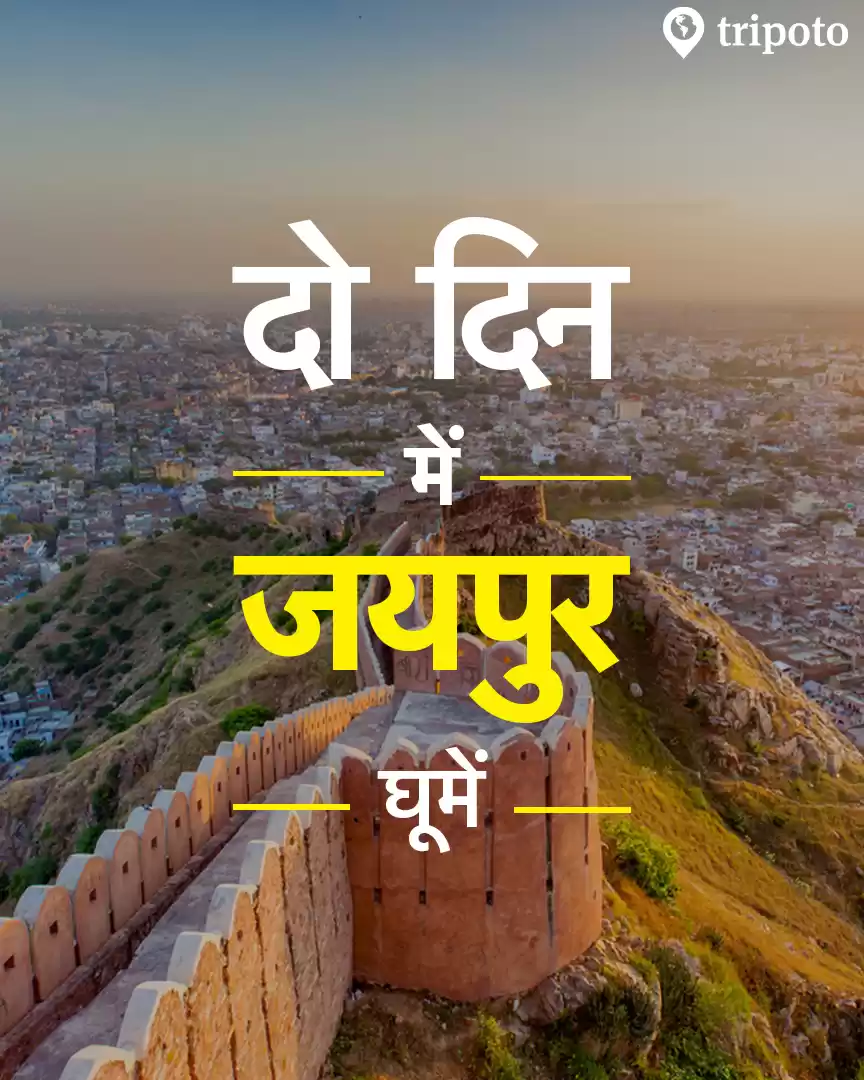
वीकेंड के लिए
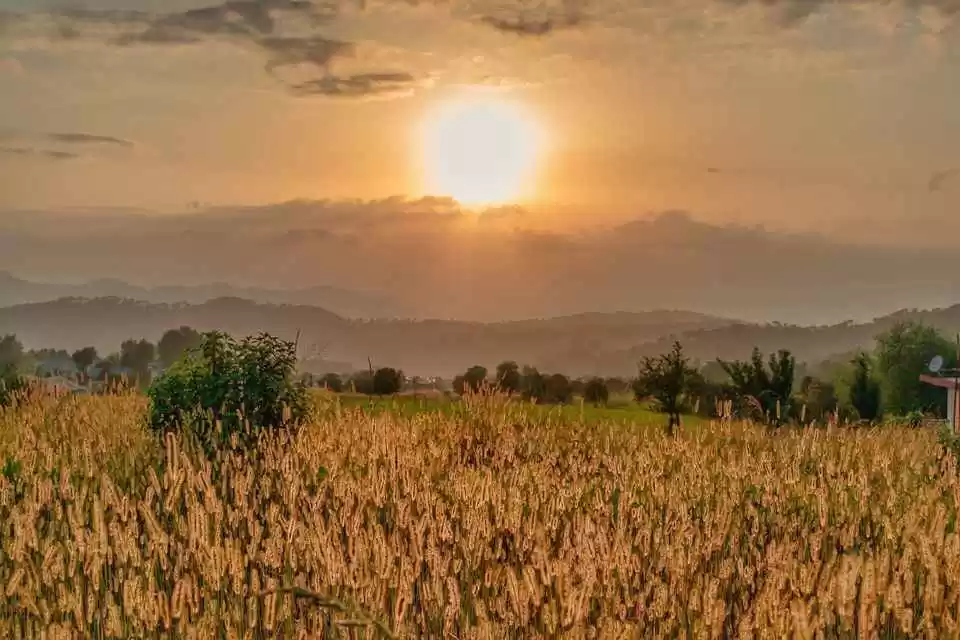
बजट में ट्रैवल
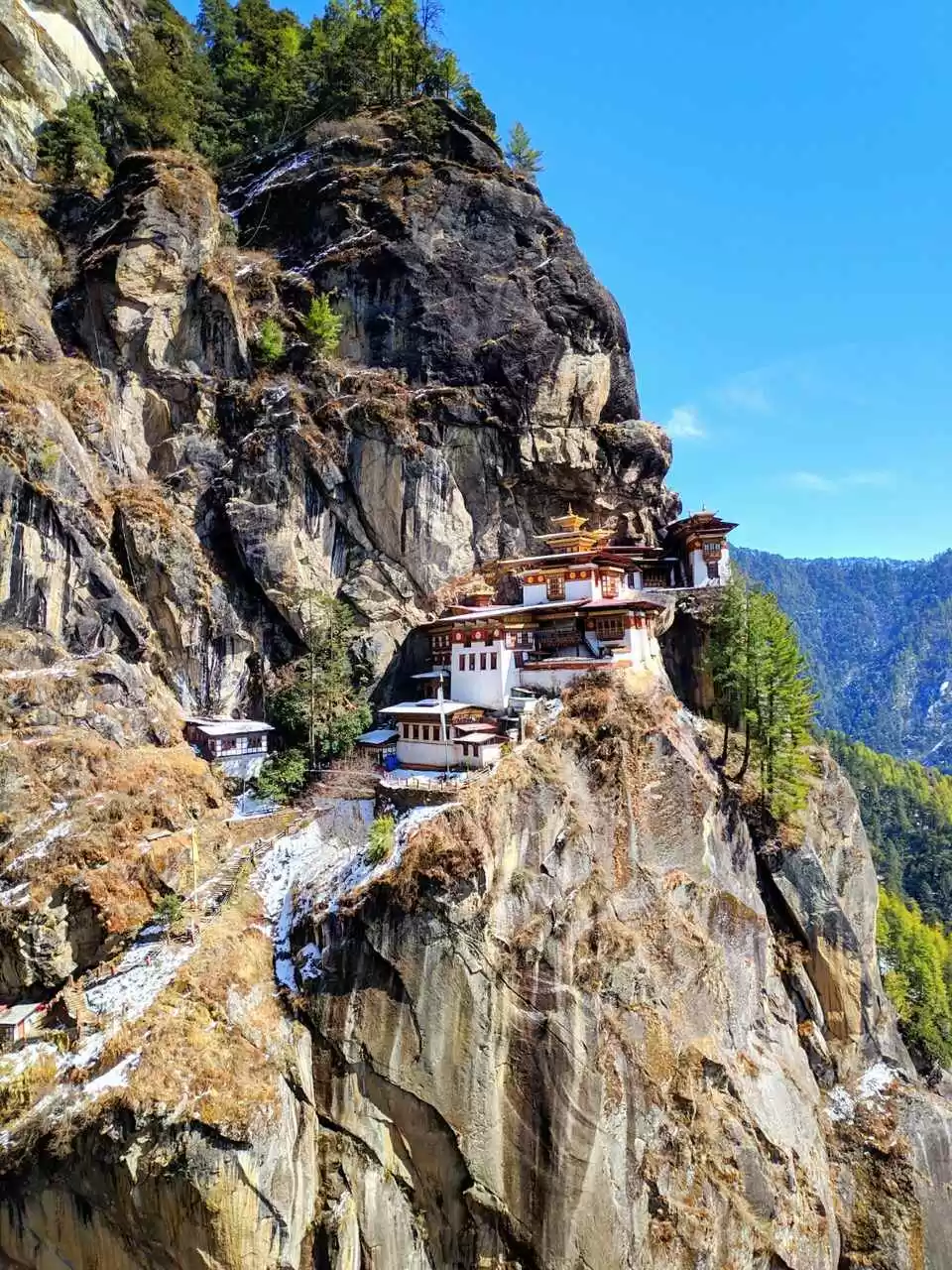
विदेश की सैर
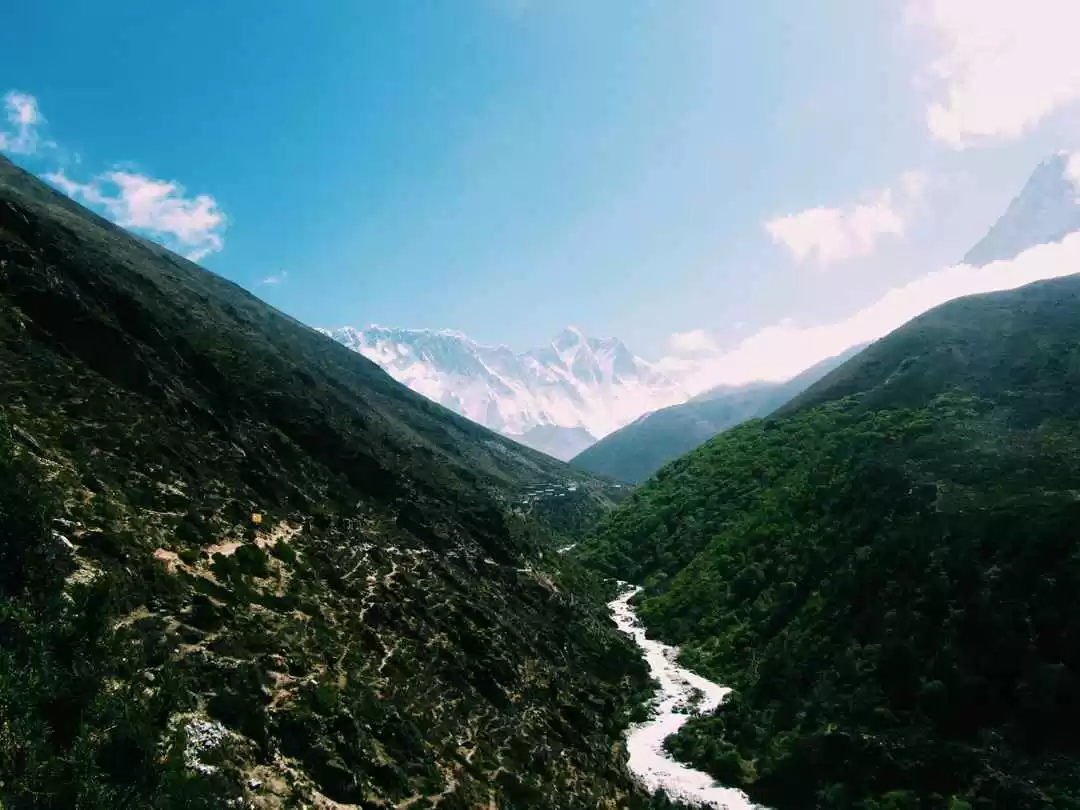
सबसे बढ़िया जगह
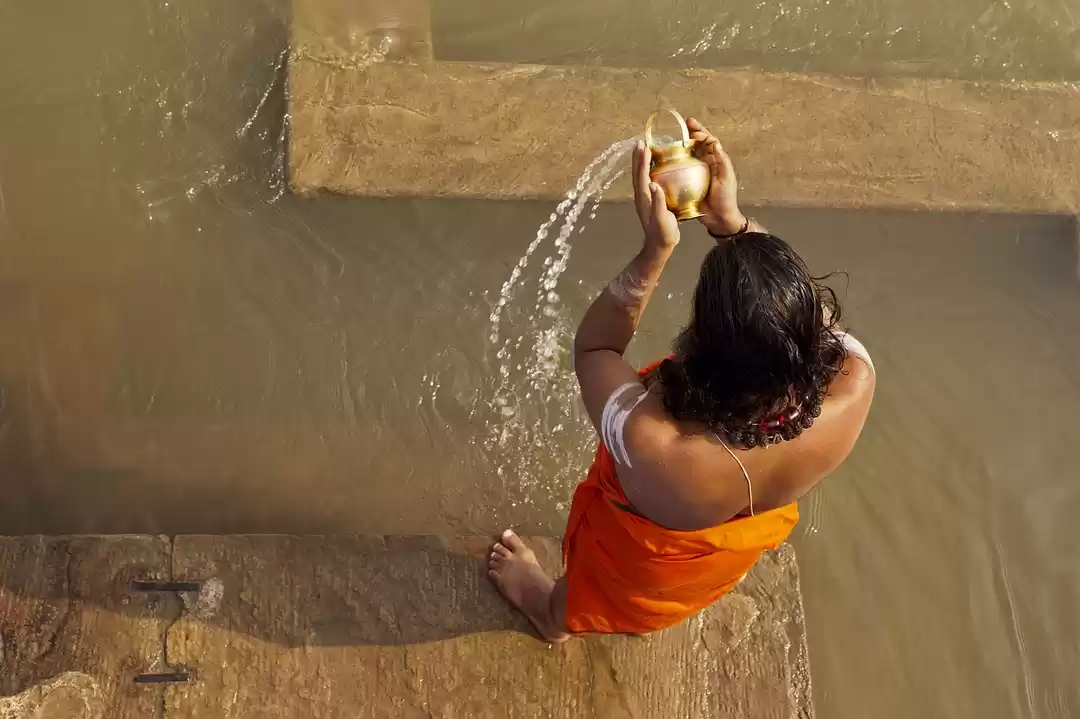
क्या आप जानते हैं?
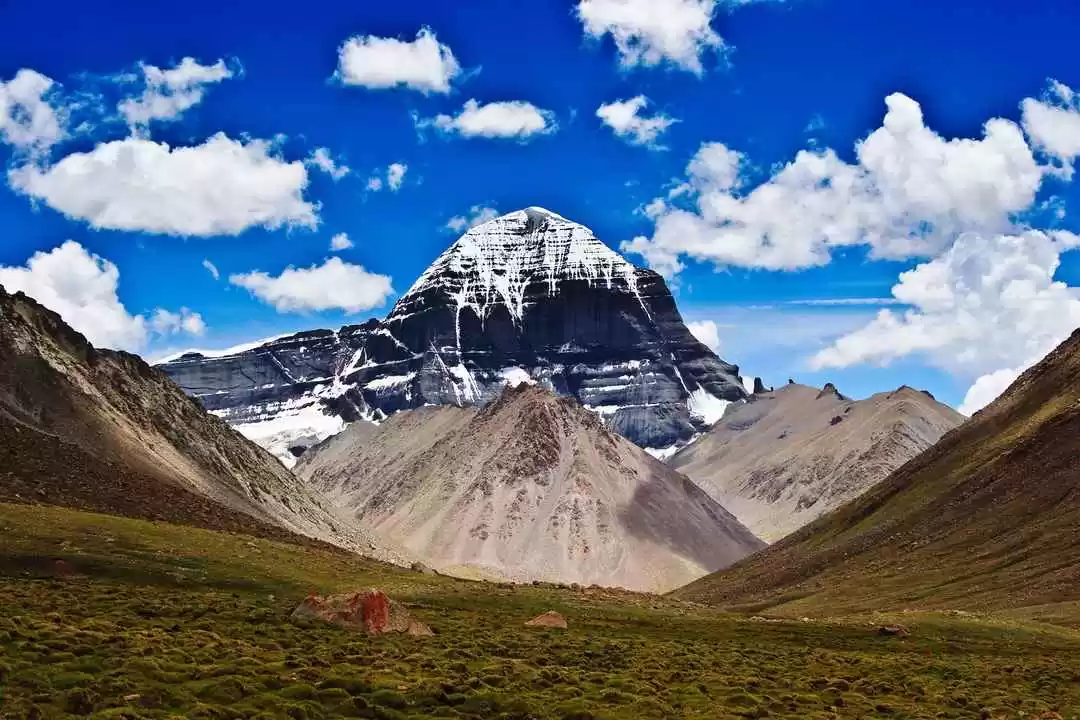
सफर के जांबाज़
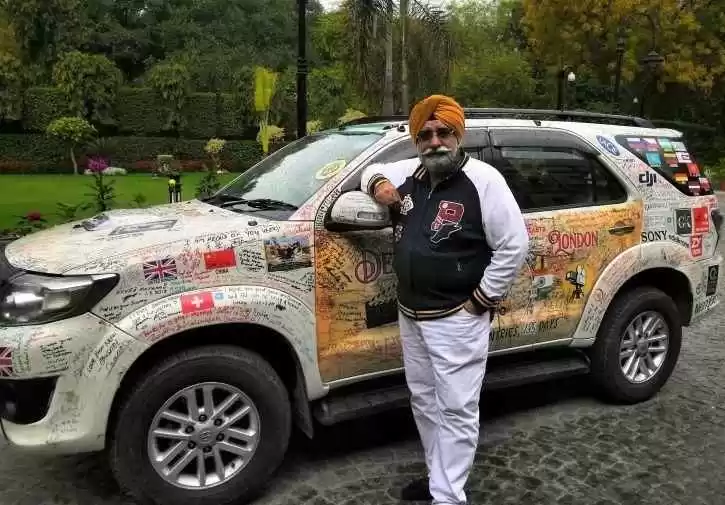
सर्वश्रेष्ठ अनुभव

Tripoto मुसाफिरों का सफरनामा
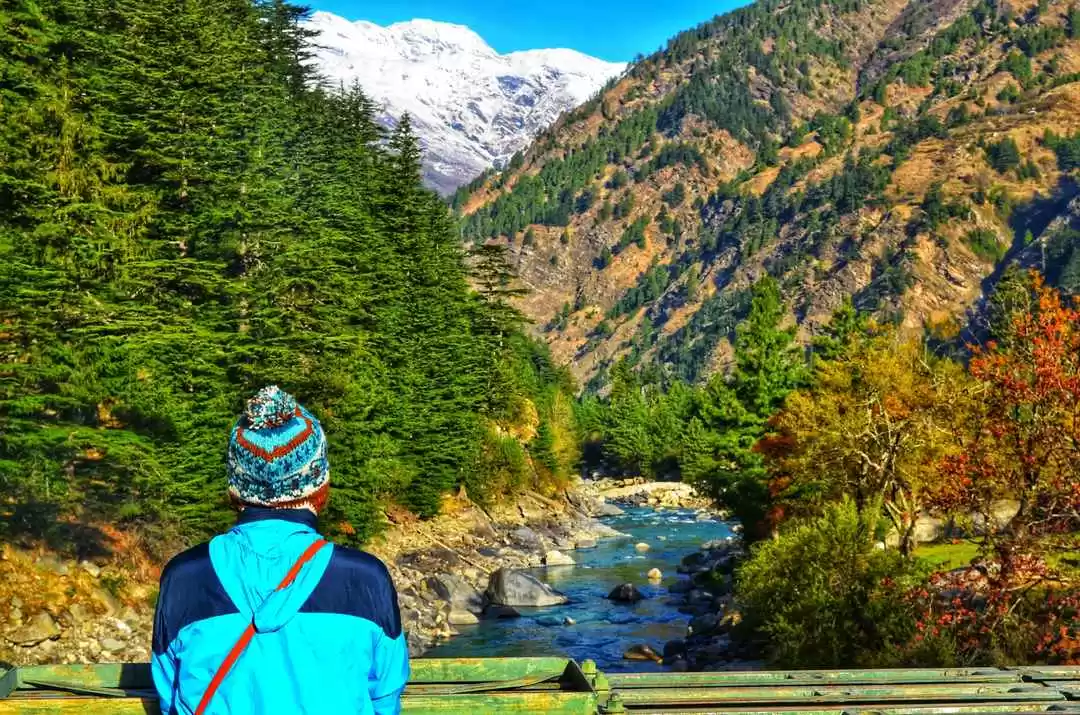

IMAGES
VIDEO
COMMENTS
Google's service, offered free of charge, instantly translates words, phrases, and web pages between English and over 100 other languages.
This travel phrase guide will introduce you to the Hindi language with details about its origin, where it’s spoken, and more importantly, how to understand and speak Hindi.
जी हां, यात्रा या घूमना-फिरना हमारे जिंदगी में एक अलग सा बदलाव ला सकता है। हमें काफी चीजों के मायने बता सकता है, हमें जीने का तरीका बता सकता है, हमें उन बातों से रूबरू करवा सकता है, जिसके बारे में हम सभी सिर्फ सुनते आ रहे हैं। तो आइए जानते हैं कि यात्रा करने से हमें क्या सीख मिलती है और क्या सबक? 1.
Travel is the movement of people between distant geographical locations. Travel can be done by foot, bicycle, automobile, train, boat, bus, airplane, ship or other means, with or without luggage, and can be one way or round trip. Travel can also include relatively short stays between successive movements, as in the case of tourism.
What Is Tourism In Hindi : (टूरिज्म क्या है) पर्यटन उन लोगों की गतिविधि को संदर्भित करता है जो अवकाश, व्यवसाय या अन्य उद्देश्यों के लिए अपने सामान्य वातावरण से बाहर यात्रा करते हैं और रहते हैं। इसमें ऐतिहासिक स्थलों, सांस्कृतिक स्थलों, प्राकृतिक आकर्षणों, कार्यक्रमों में भाग लेने और बाहरी मनोरंजक गतिविधियों में भाग लेने जैसी गतिविधियों की एक विस...
Hindi Vocabulary for Travel and Tourism. Traveling to a Hindi-speaking region can be an exhilarating experience. Whether you’re a globe-trotter or a first-time tourist, getting familiar with the local language can greatly enhance your trip.
Whether you’re about to travel in Hindi-speaking areas or explore the southern region, knowing some essential Hindi travel phrases is a sure-shot way to have a safe and gratifying journey. So, brace yourself for a quick language ride and let’s make this trip more enjoyable with some useful Hindi phrases for travel in India .
TRAVEL translate: (लंबी दूरी की) यात्रा, यात्रा करना, सफर करना, यात्रा की गतिविधि. Learn more in the Cambridge English-Hindi Dictionary.
travel का हिन्दी अनुवाद. /ˈtrævəl ˈट्रैव़ल्/ शब्द प्रारूप: travels, travelling, travelled or traveling, traveled. 1. अकर्मक क्रिया. If you travel, you go from one place to another, often to a place that is far away. यात्रा करना सफर करना. I've been travelling all day. 2. अगणनीय संज्ञा. Travel is the act of travelling. यात्रा nf सफर mn.
जानिए किसी यात्रा का वर्णन एवम घुमने की जगह से जुडी सभीां जानकारियां हिंदी में Tripoto पर | पढ़े और लिखे यात्रा कहानियां, हिंदी यात्रा ...